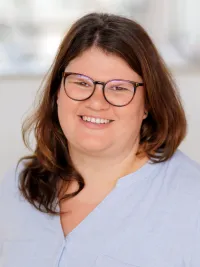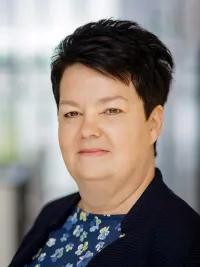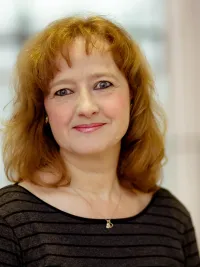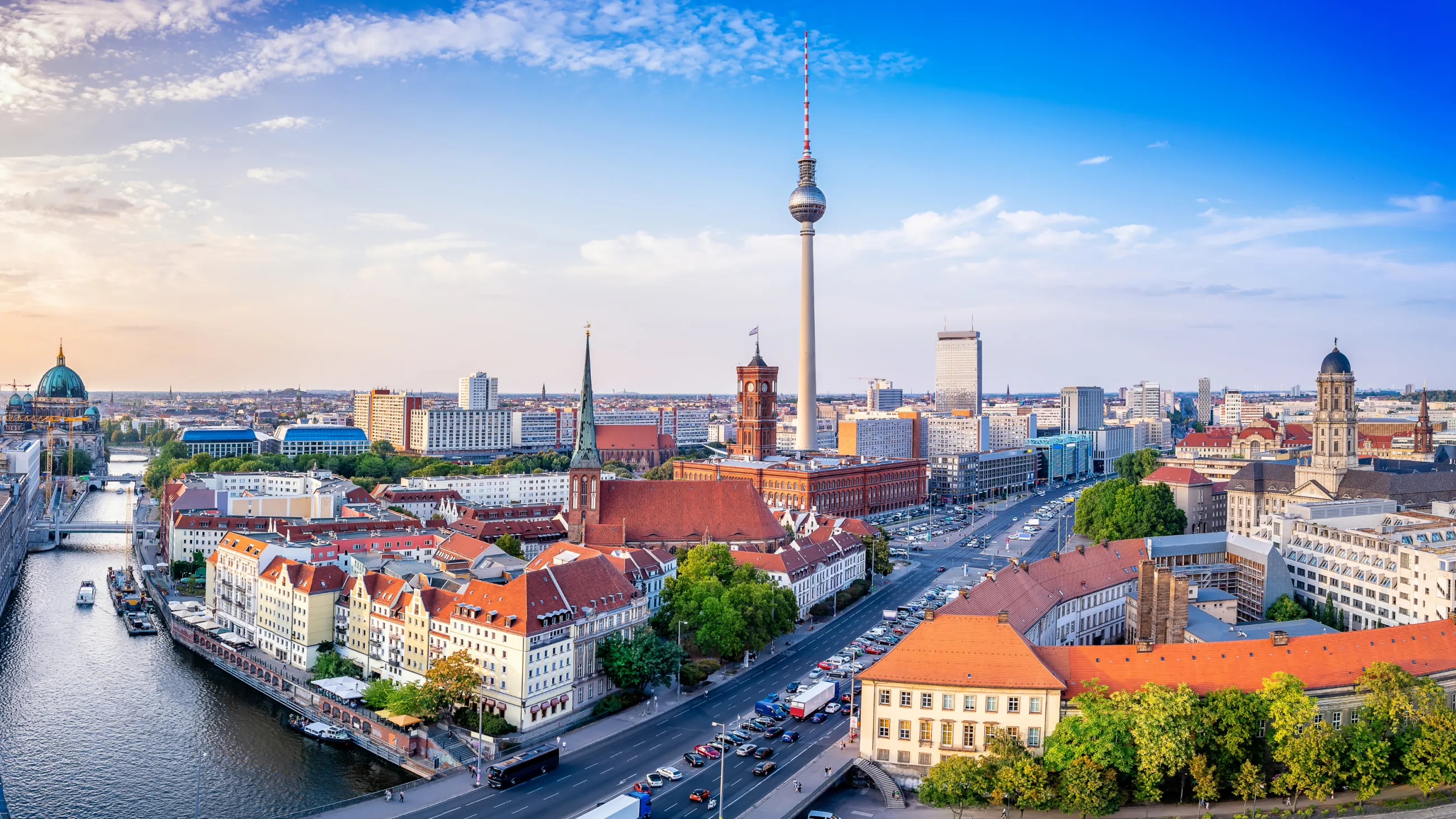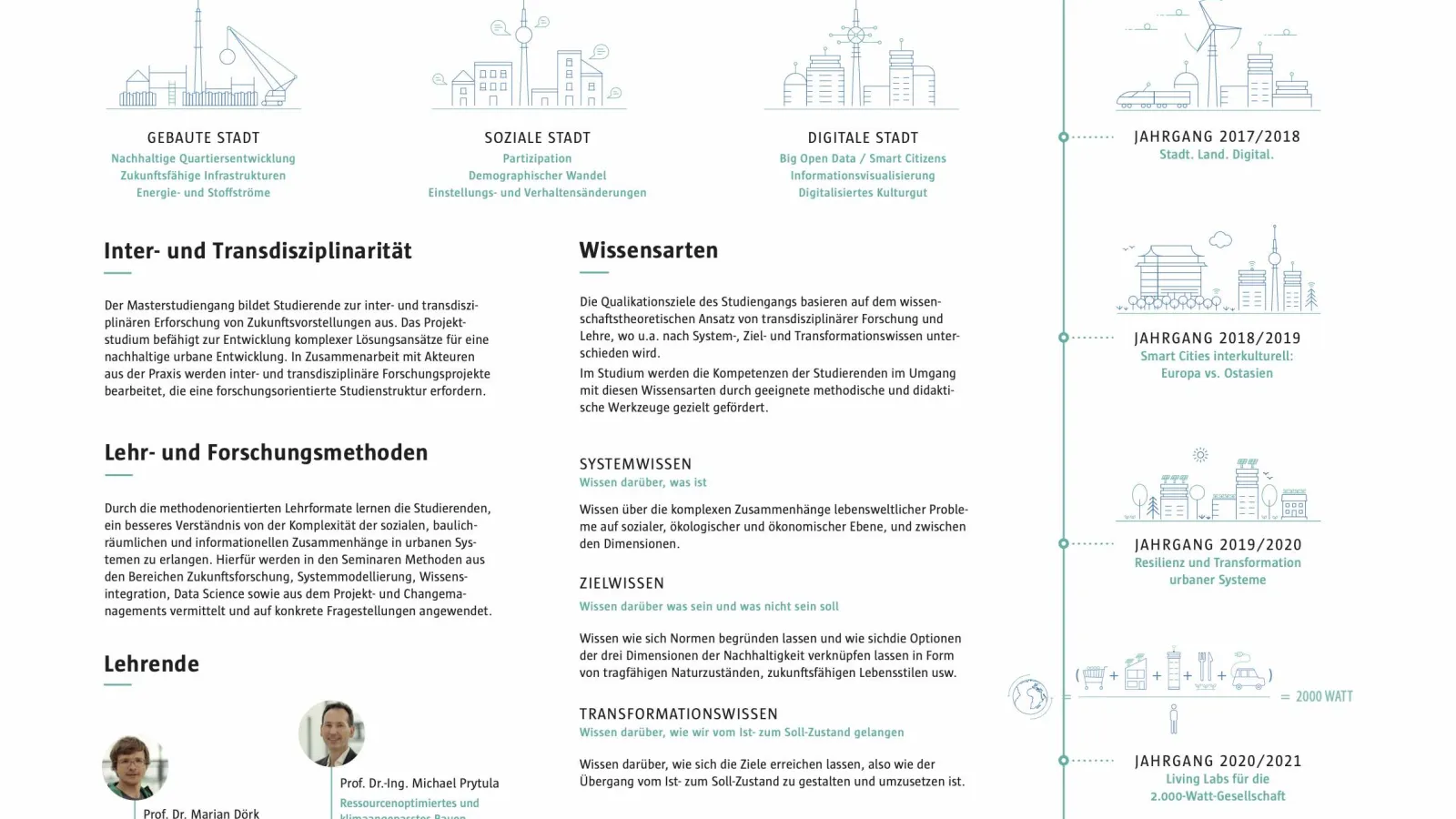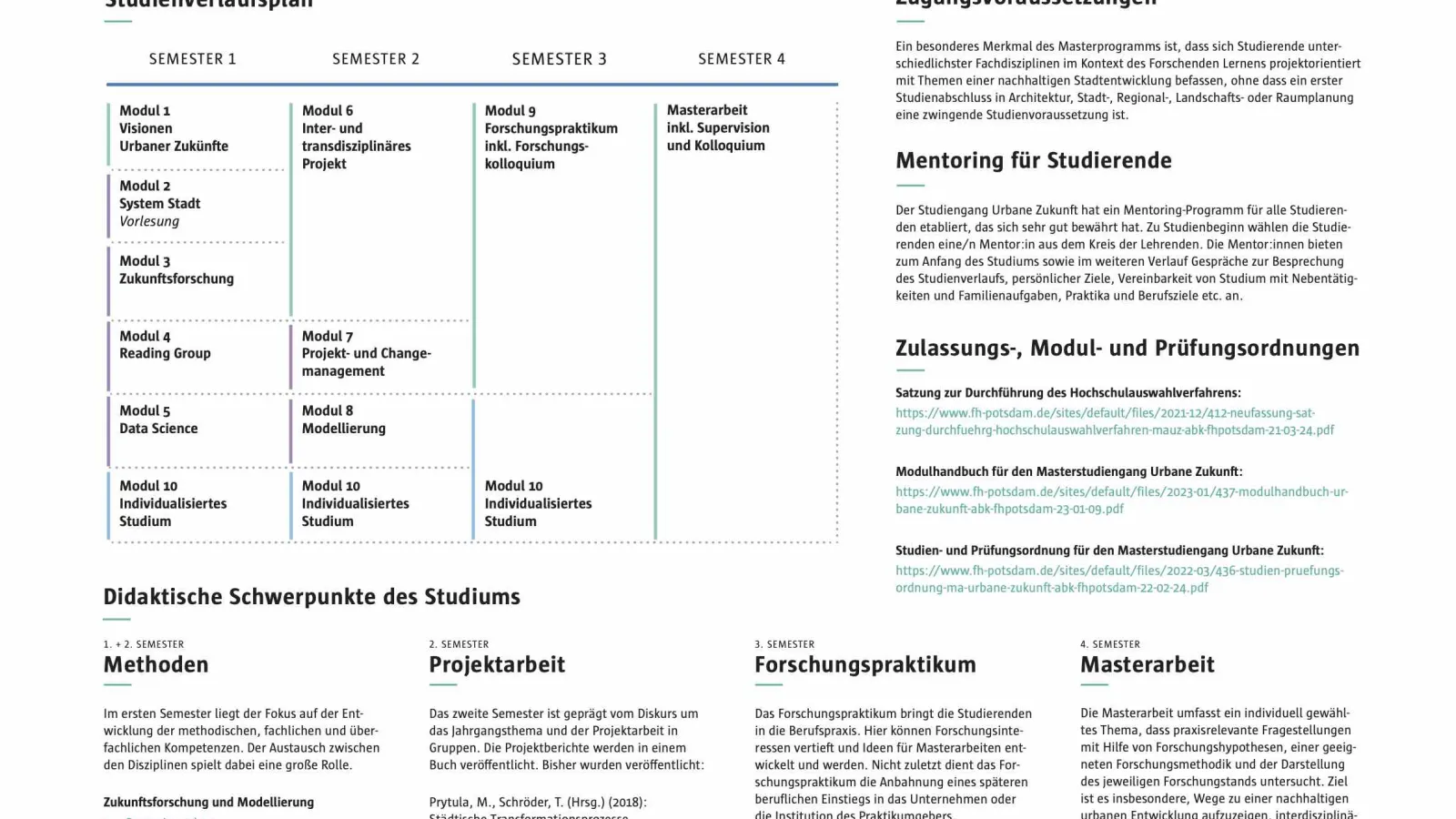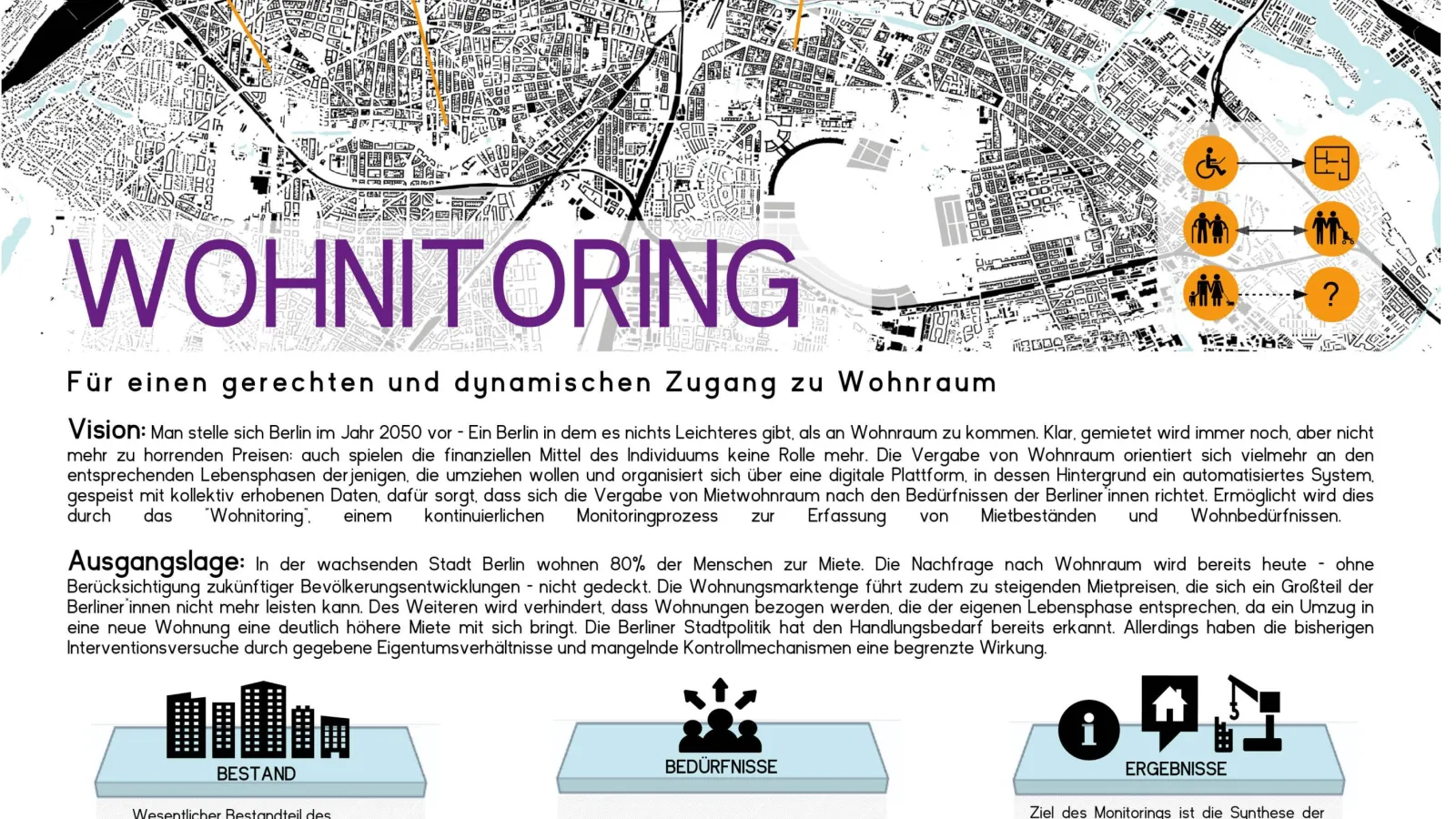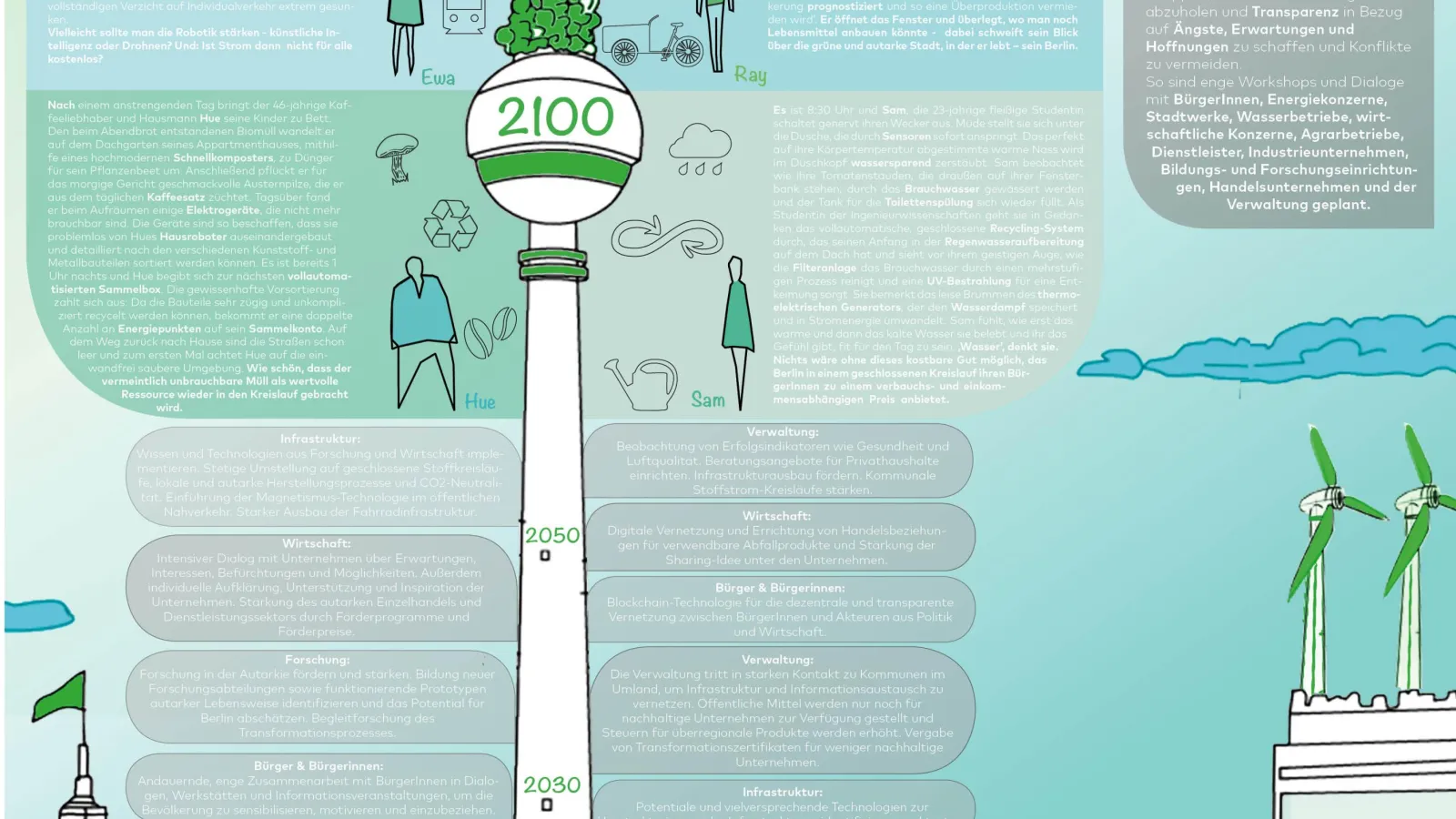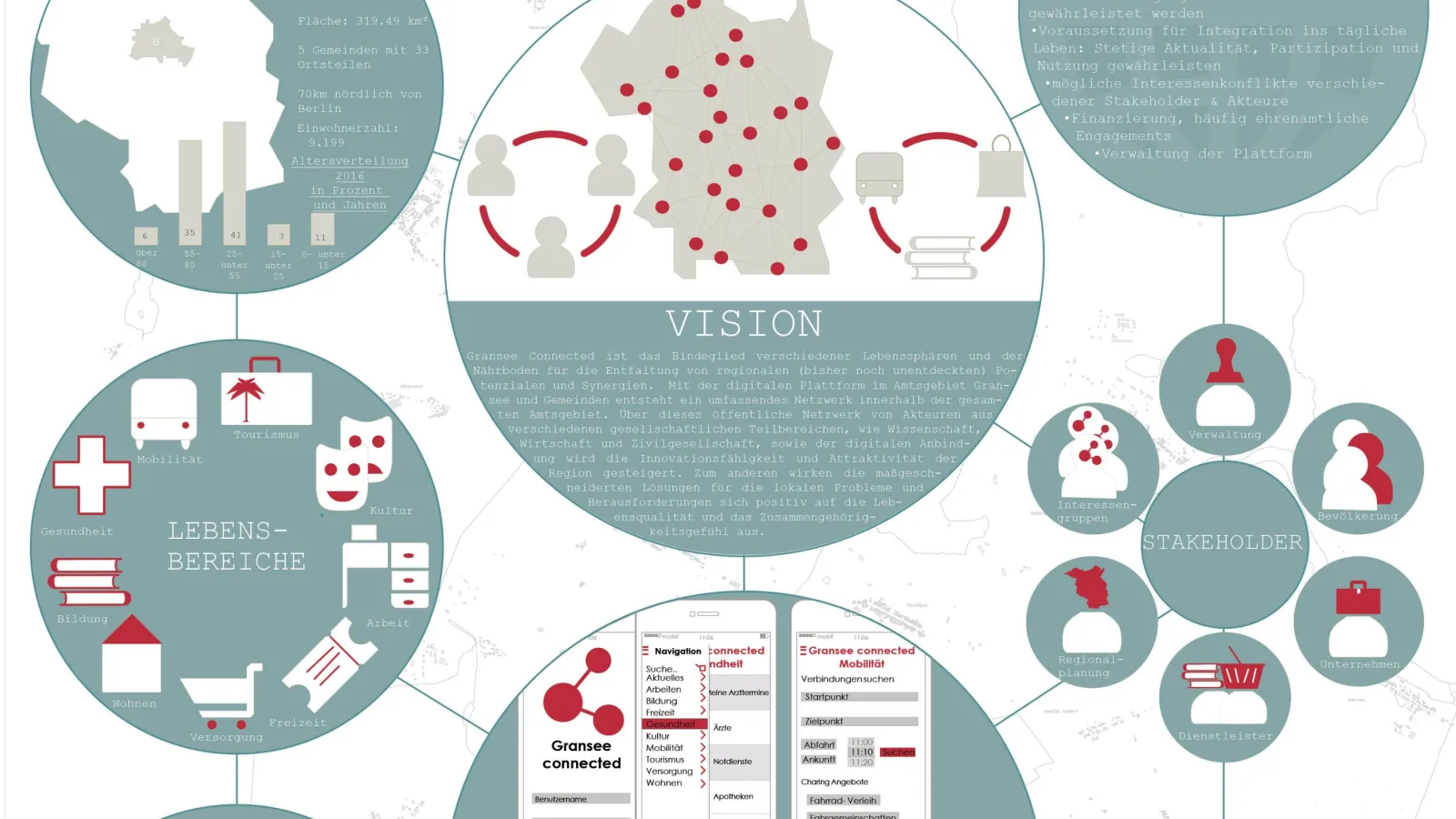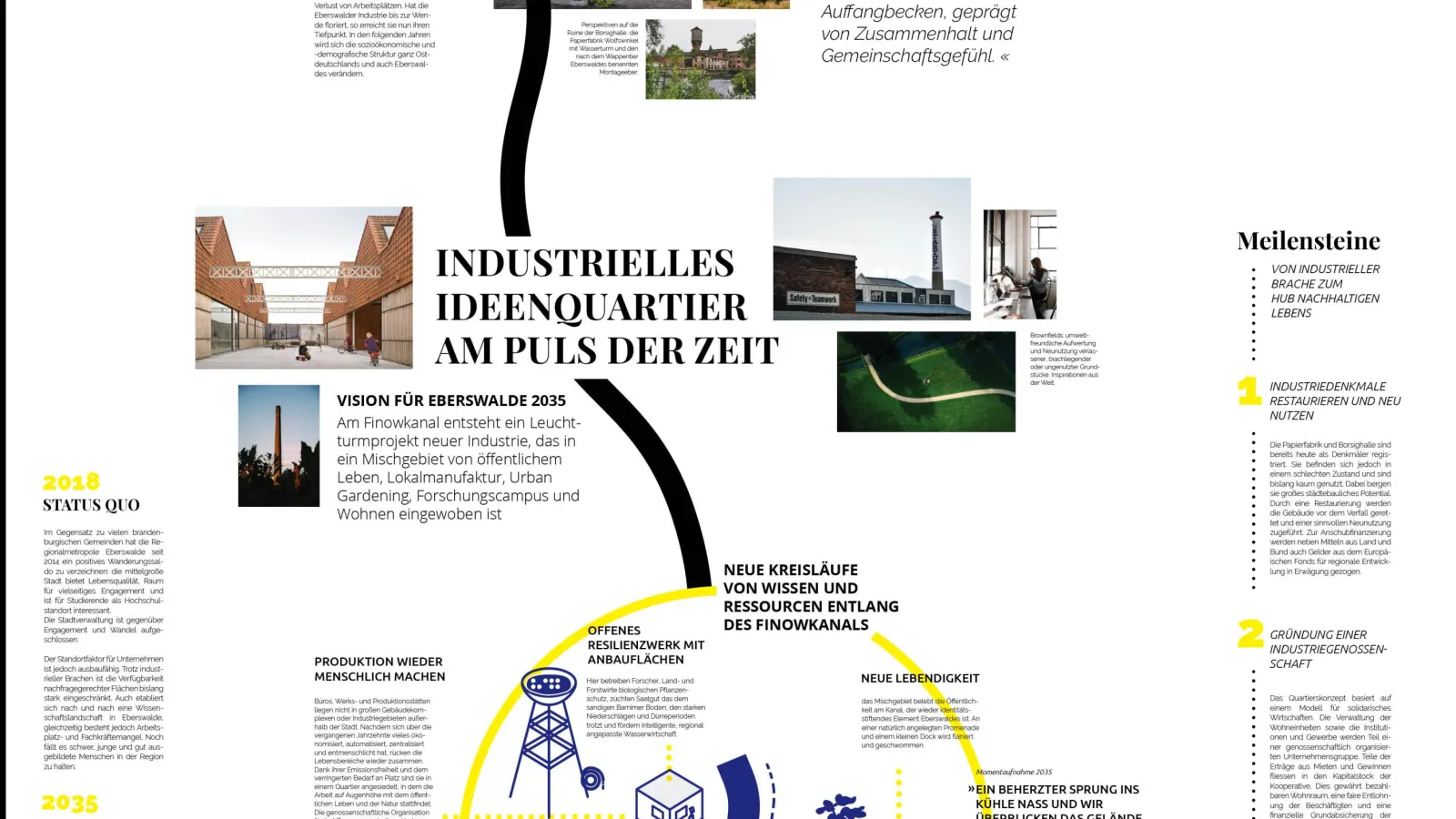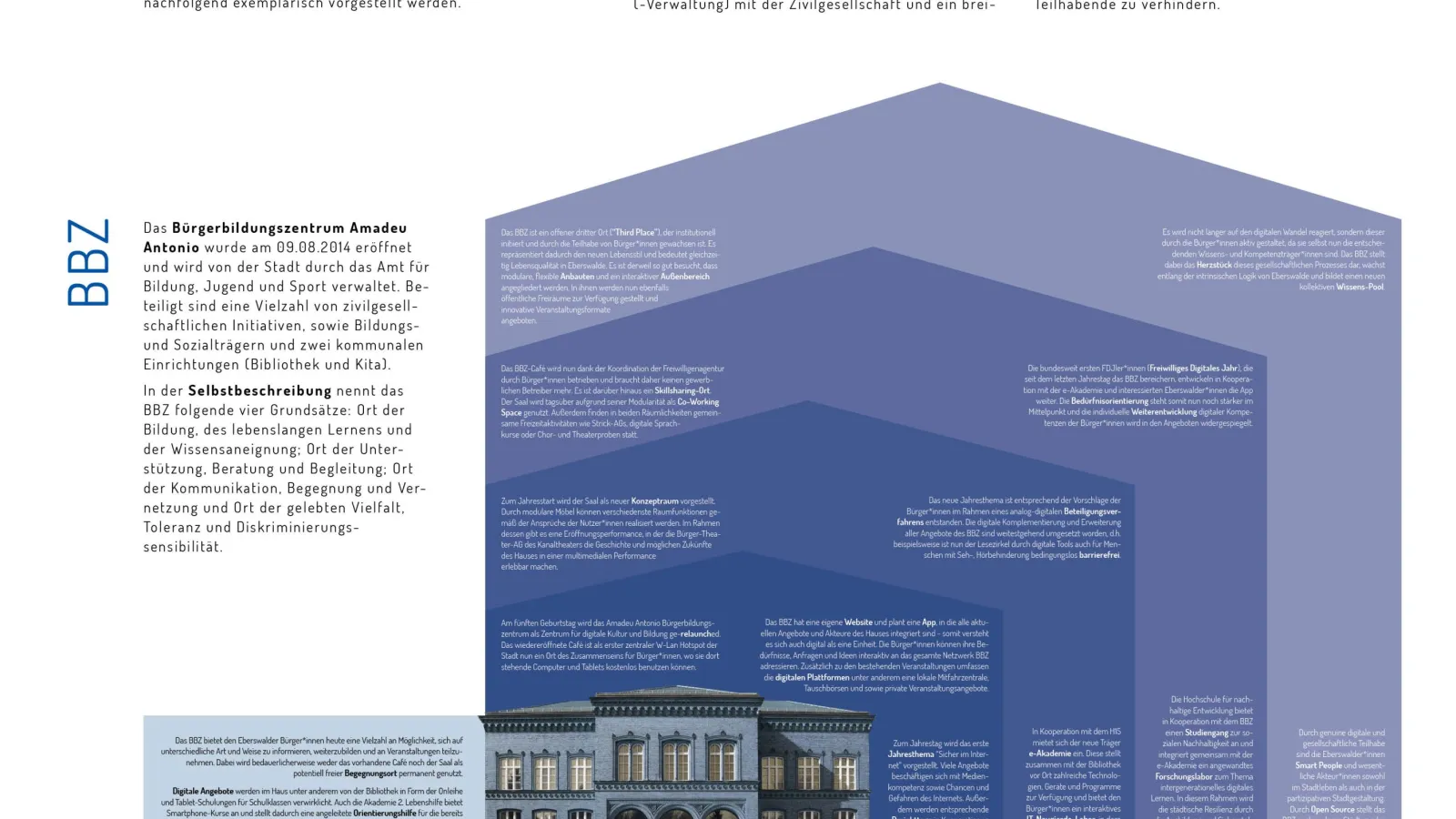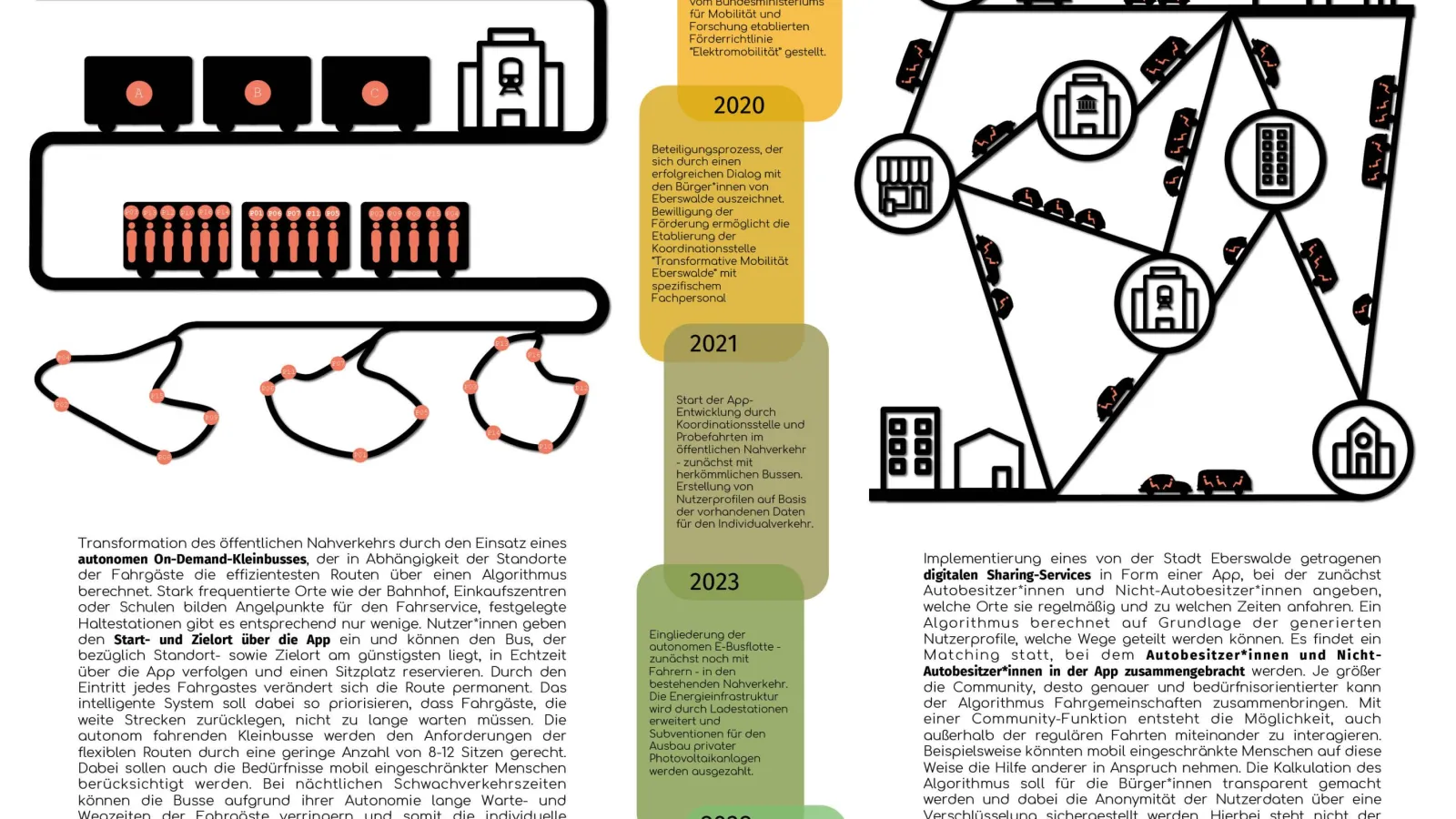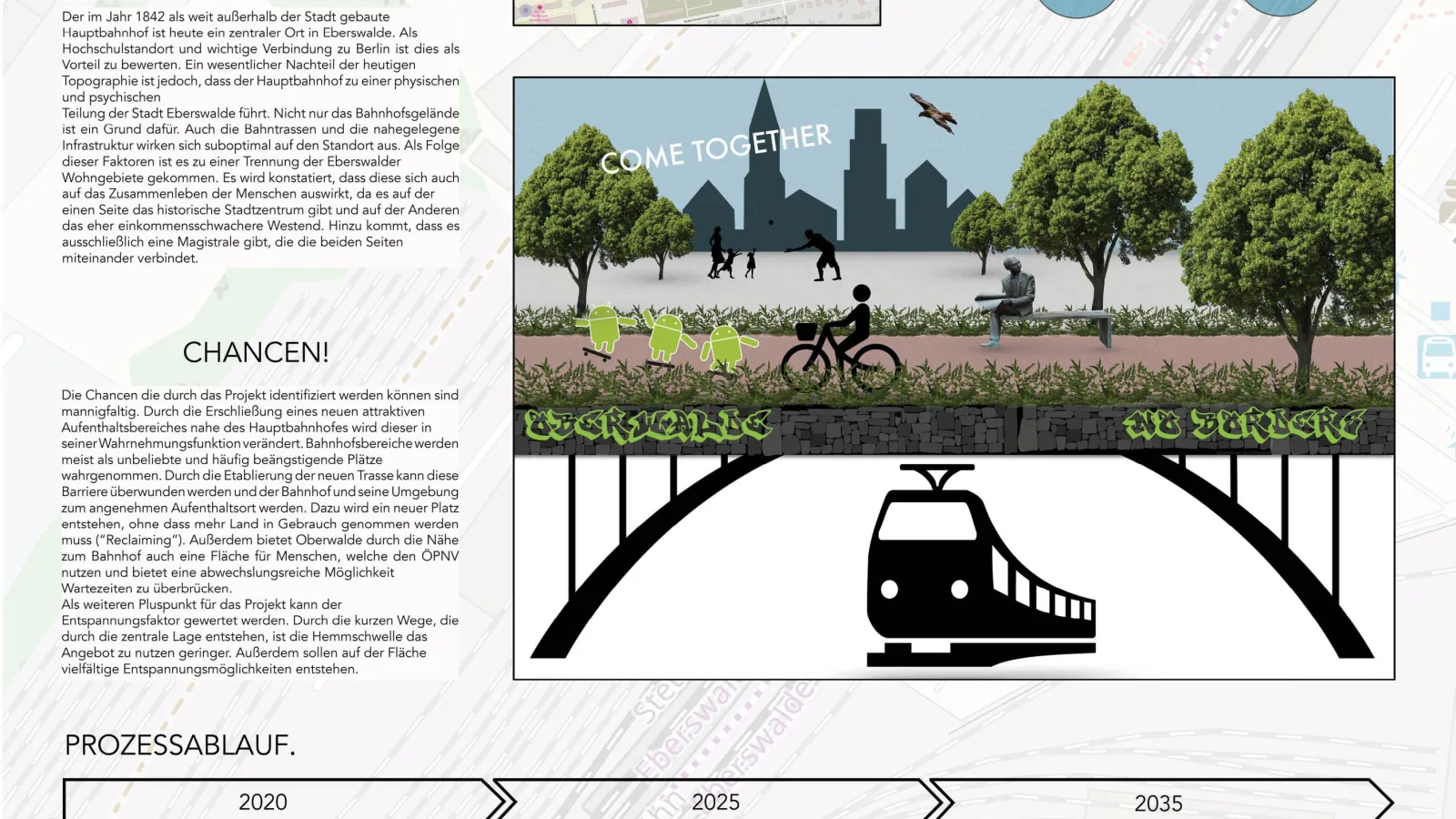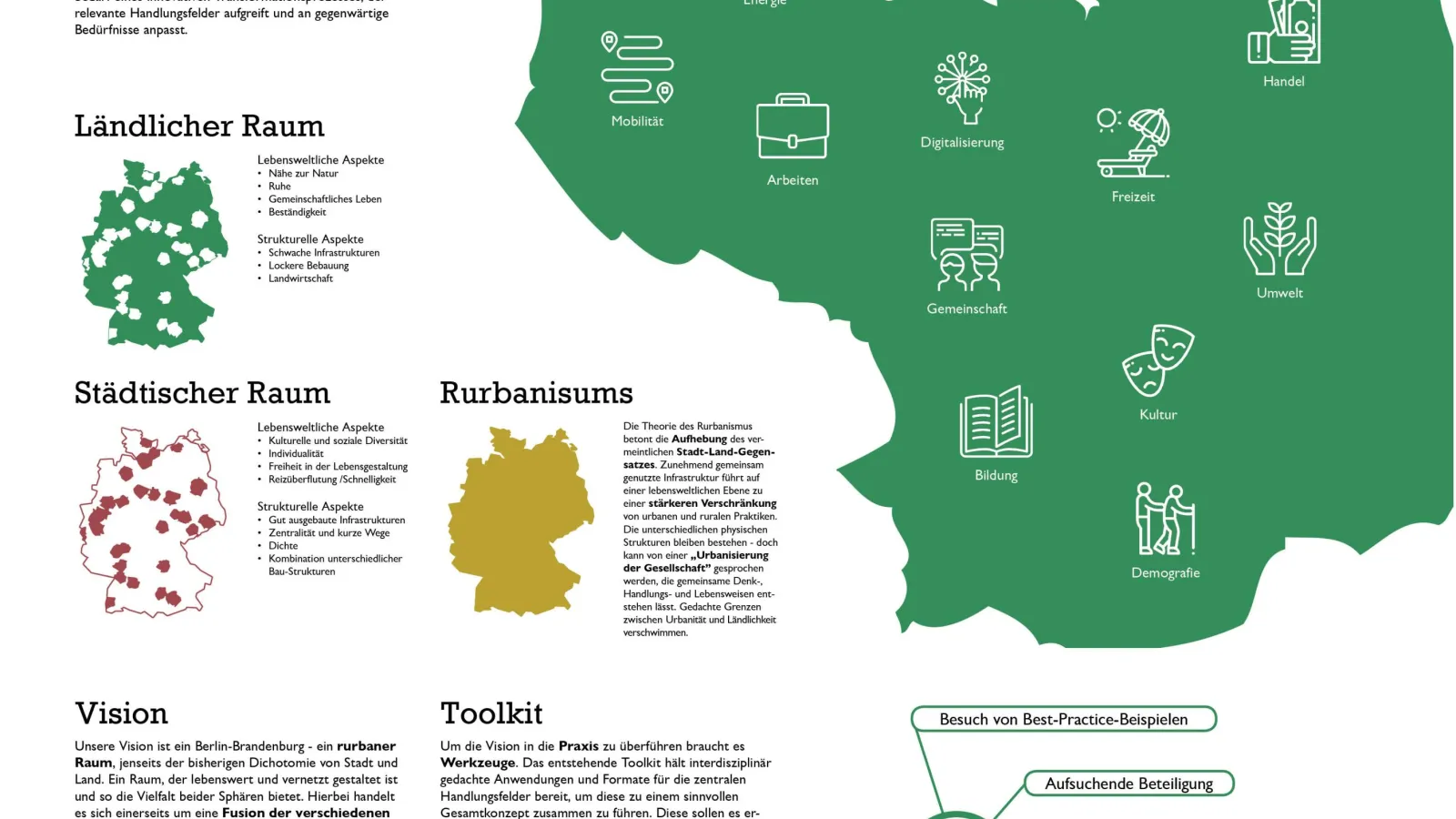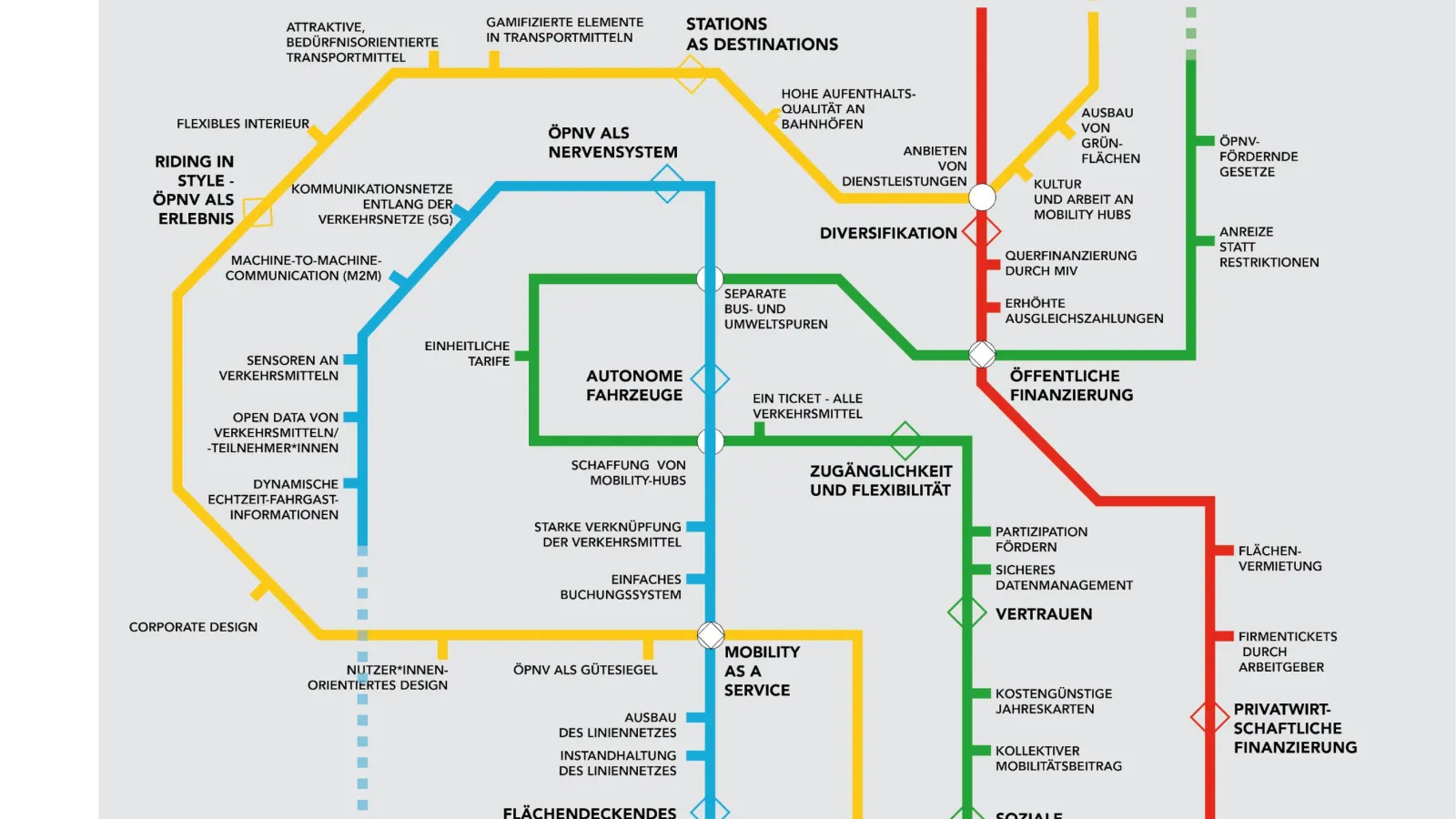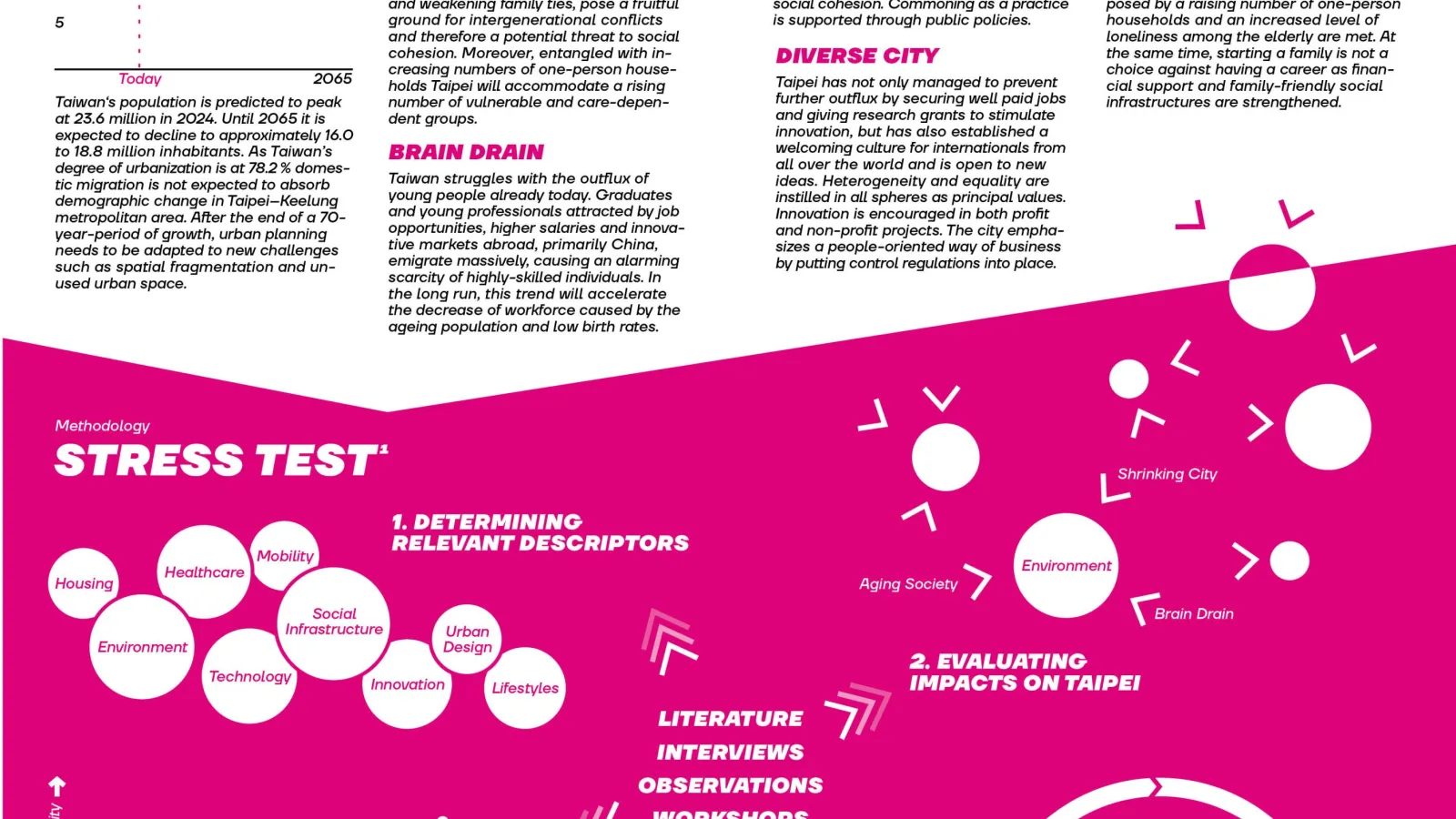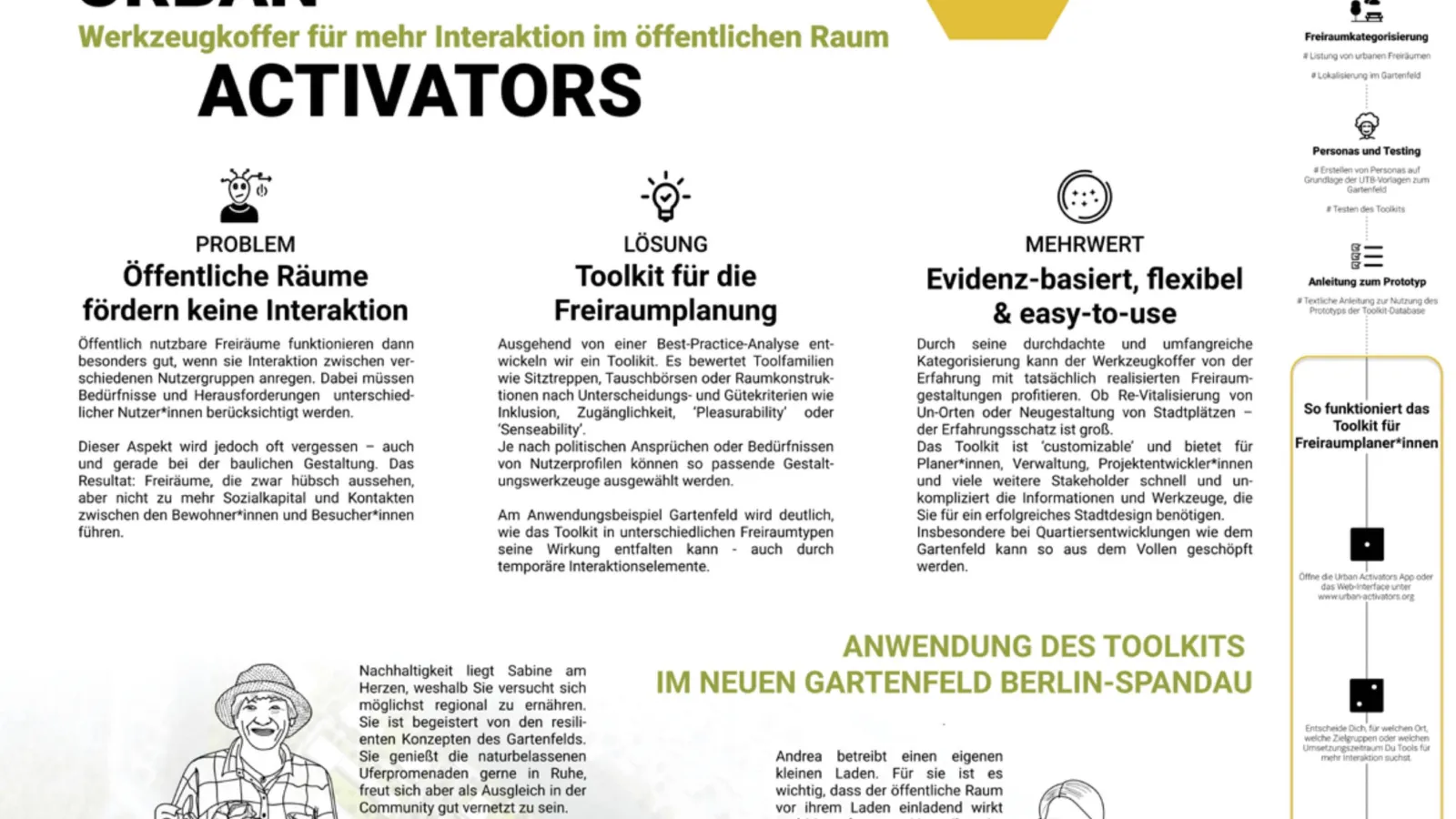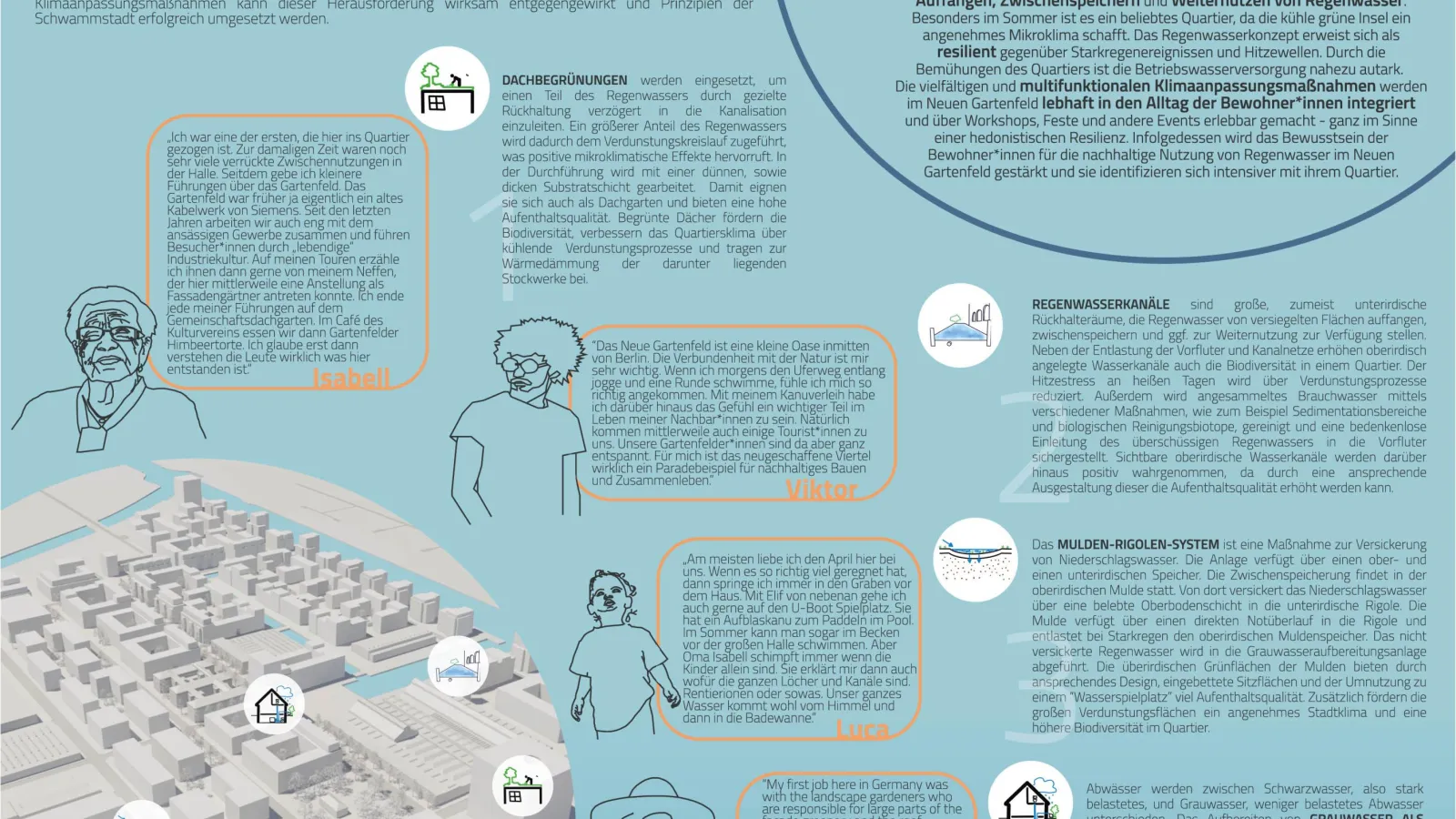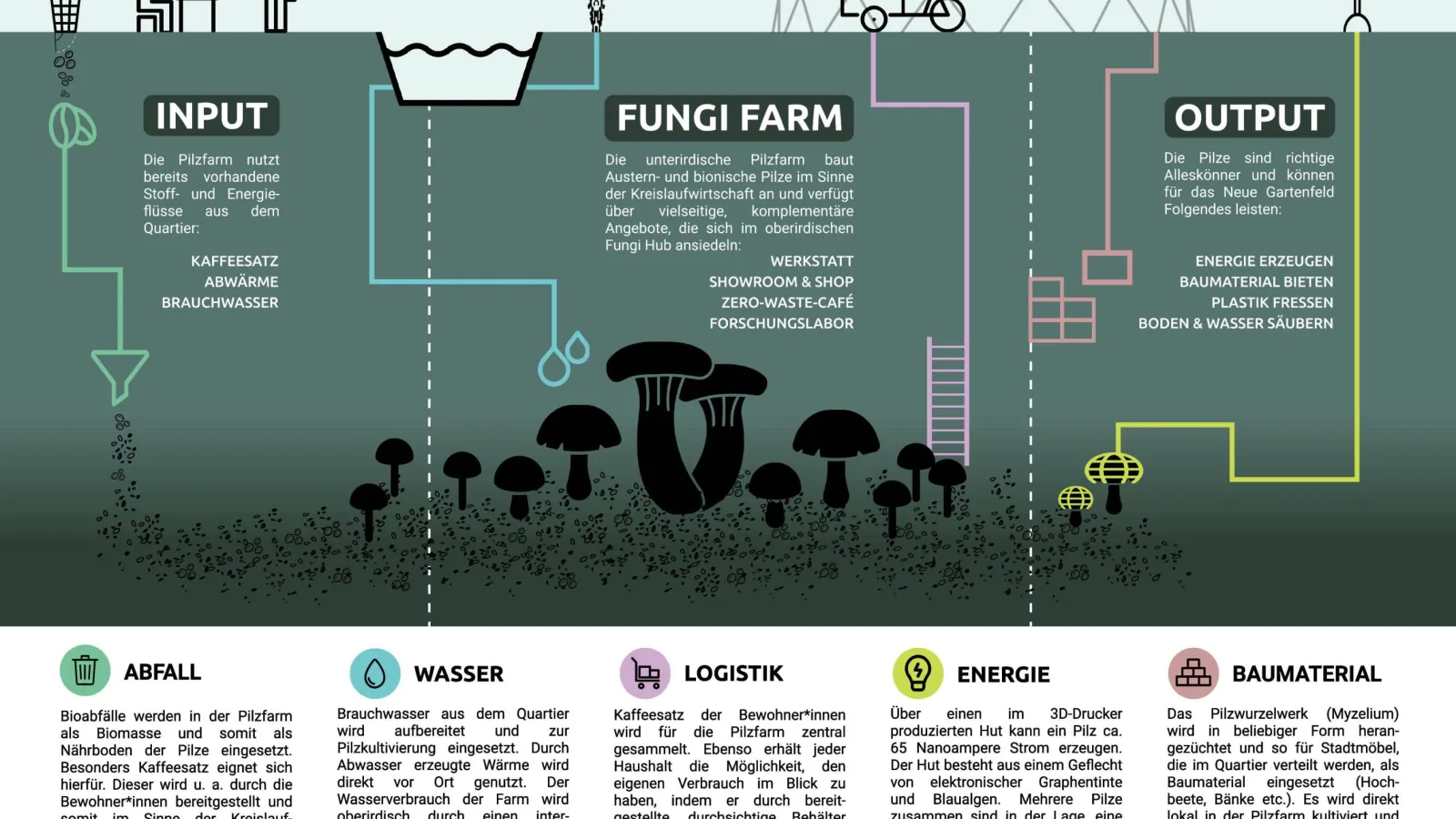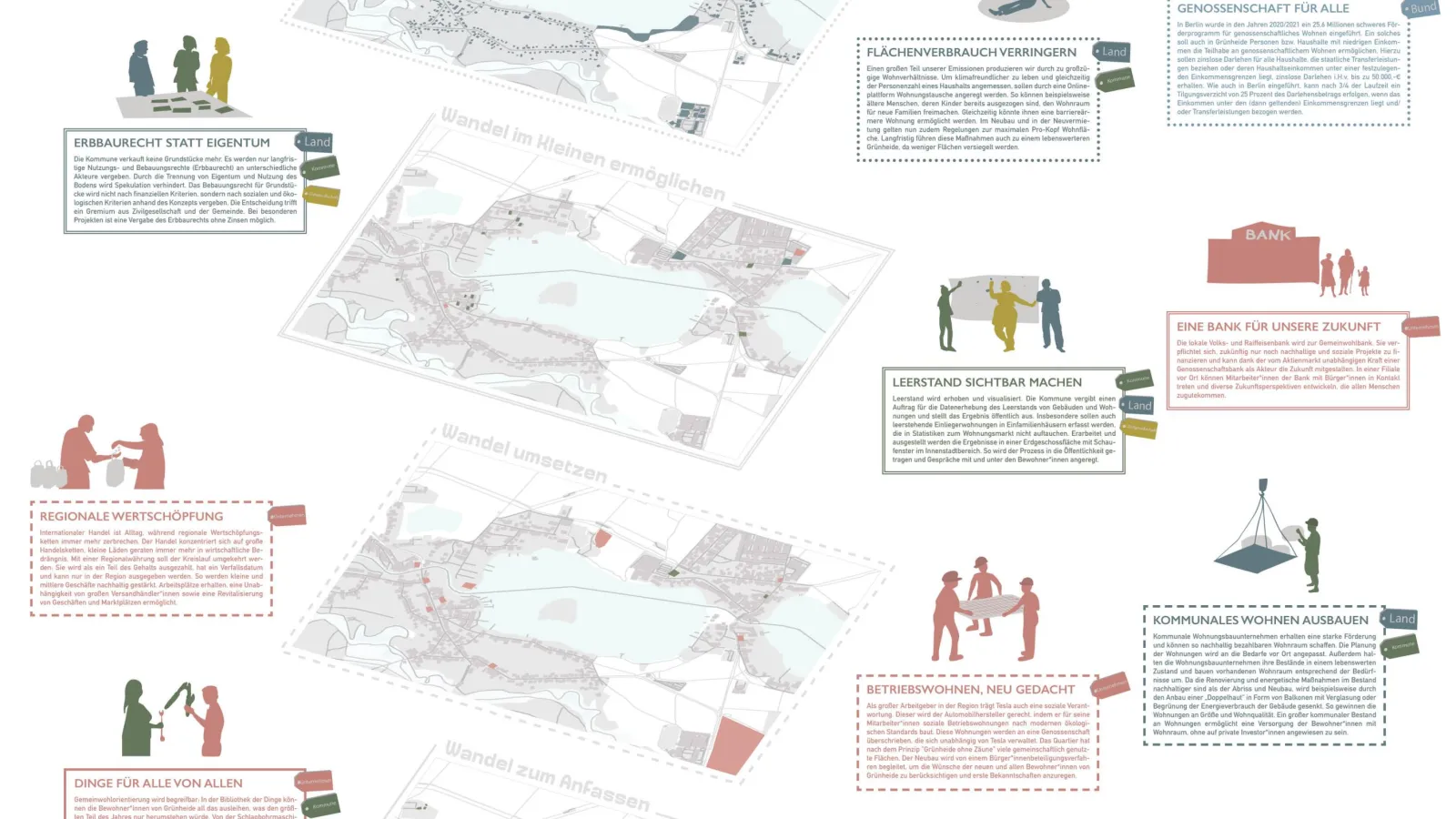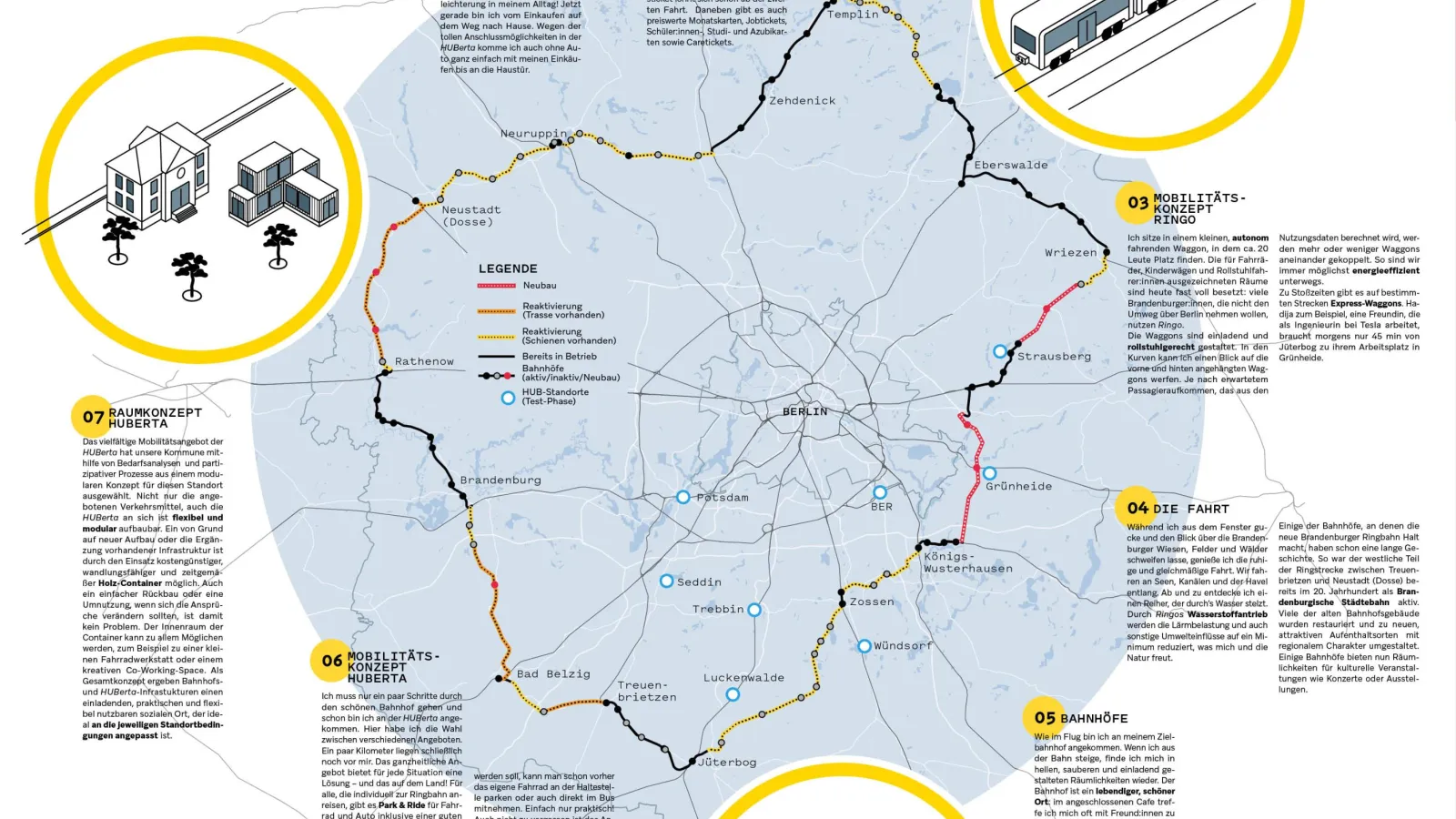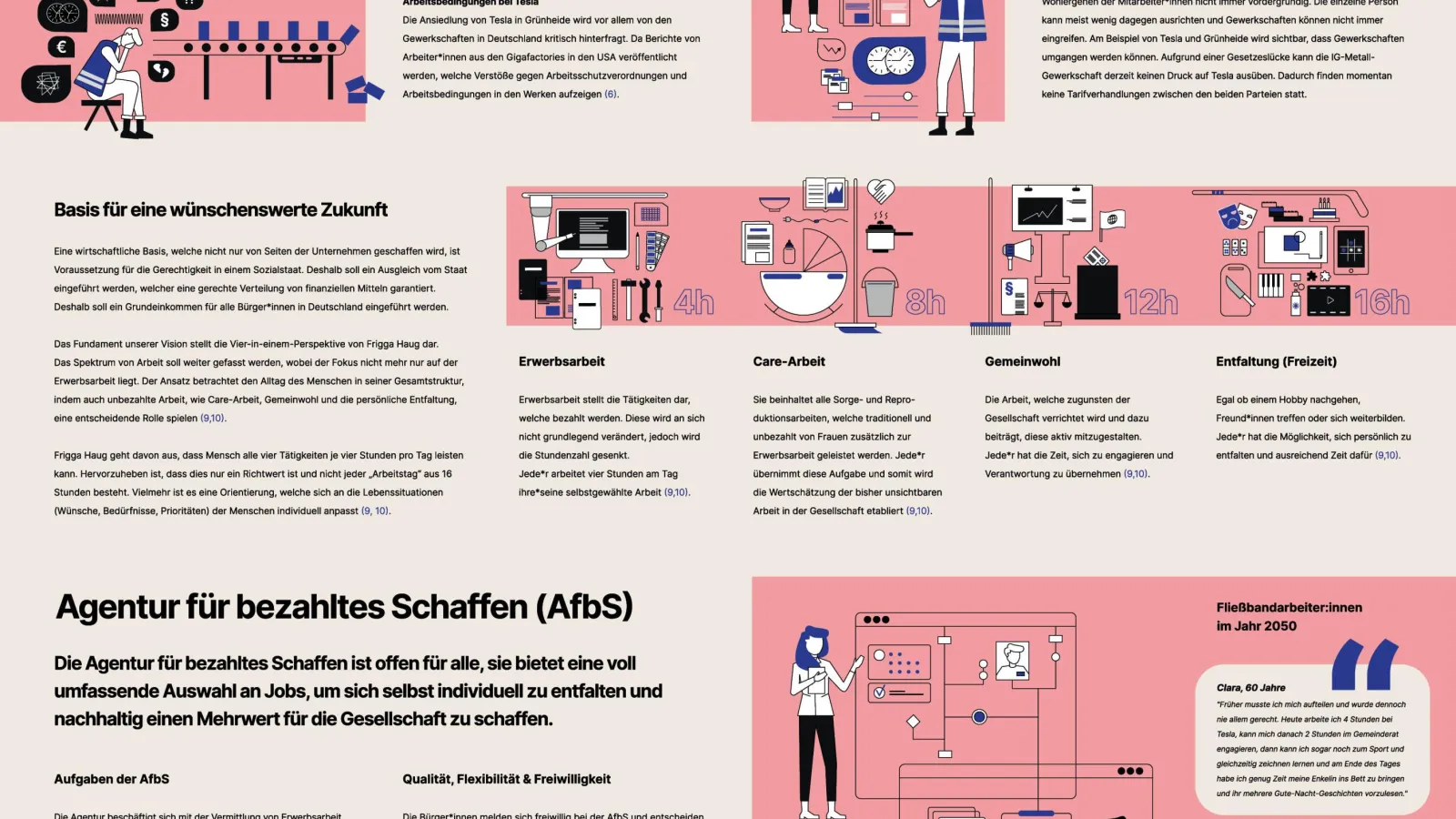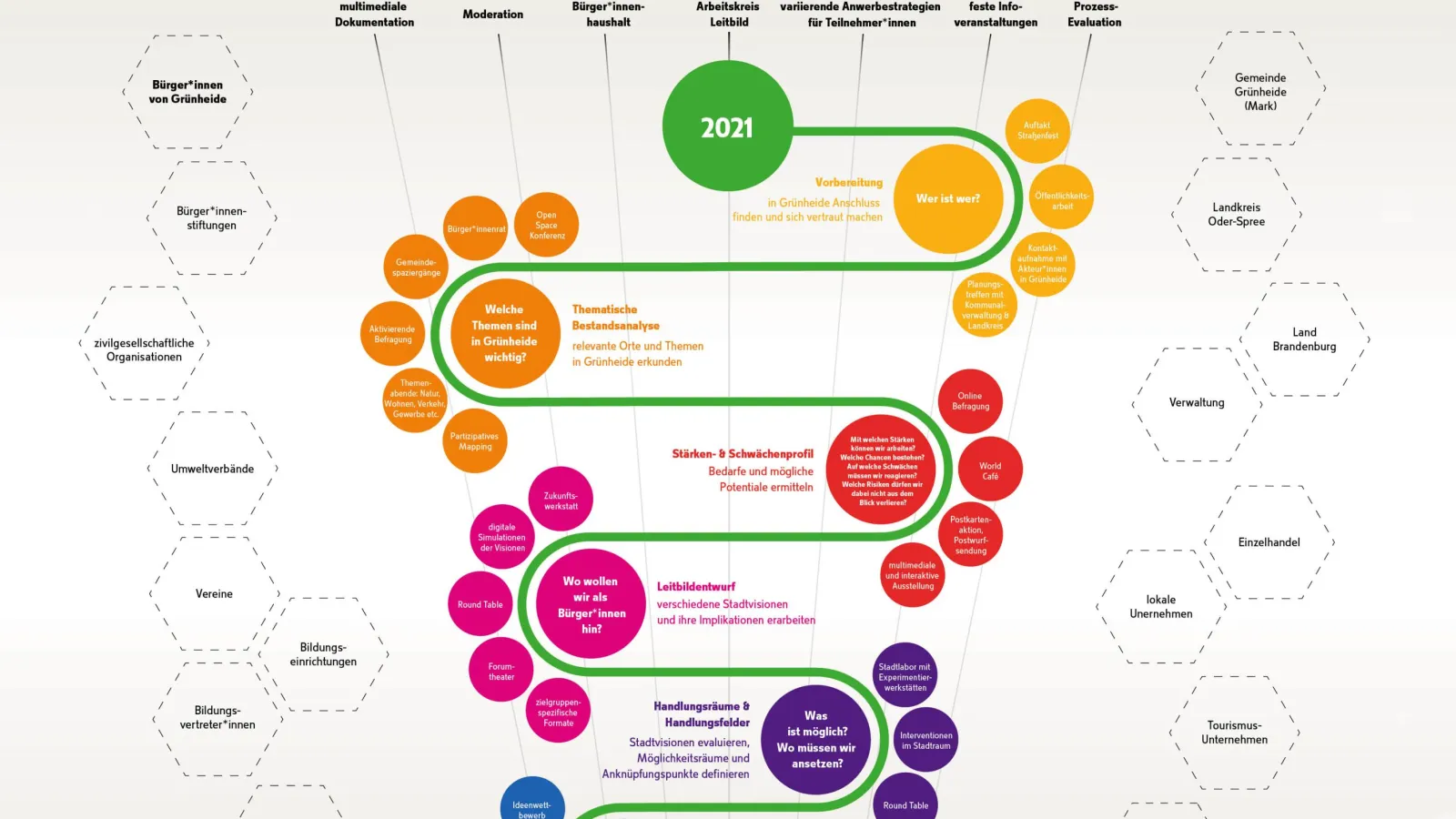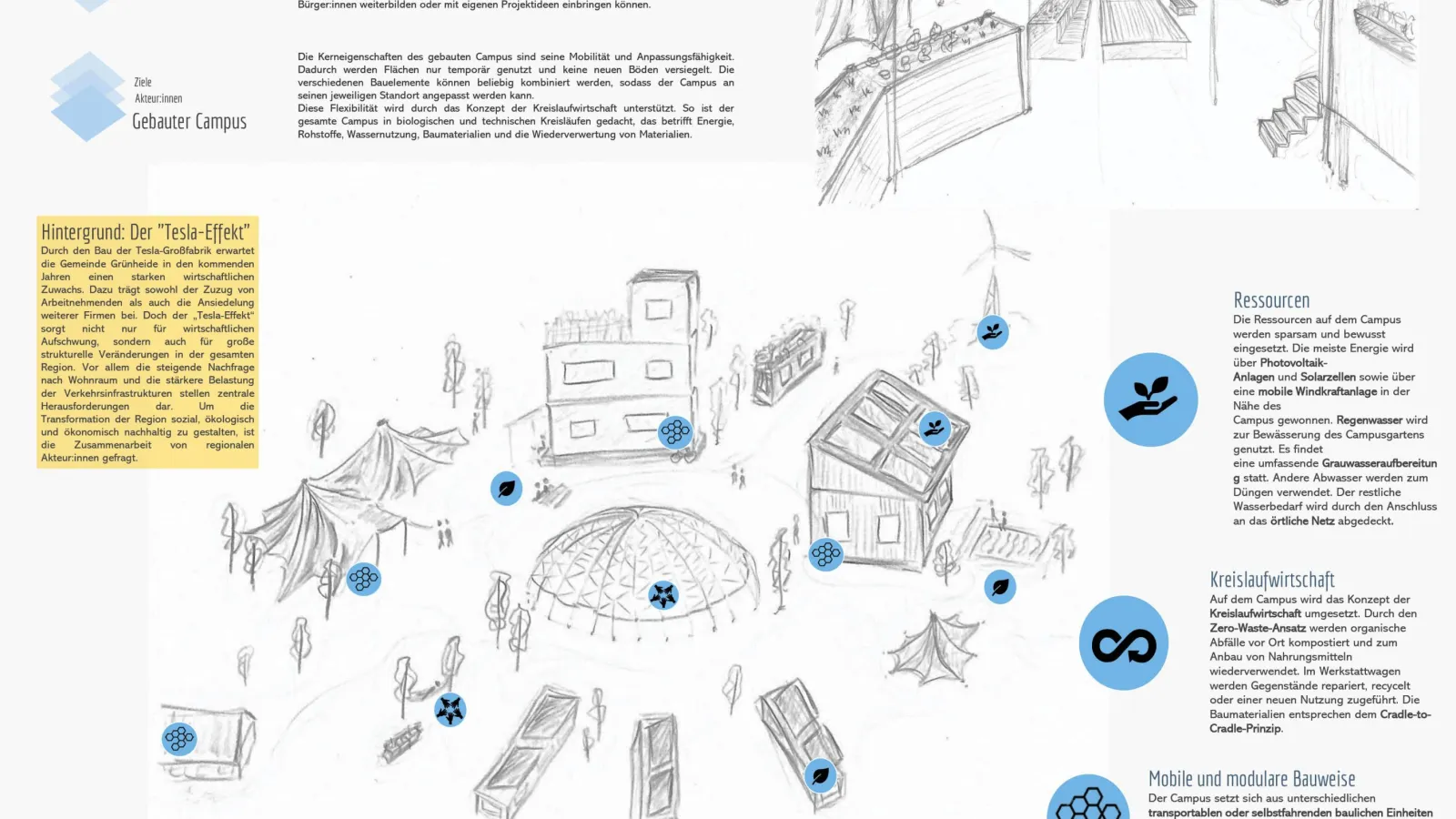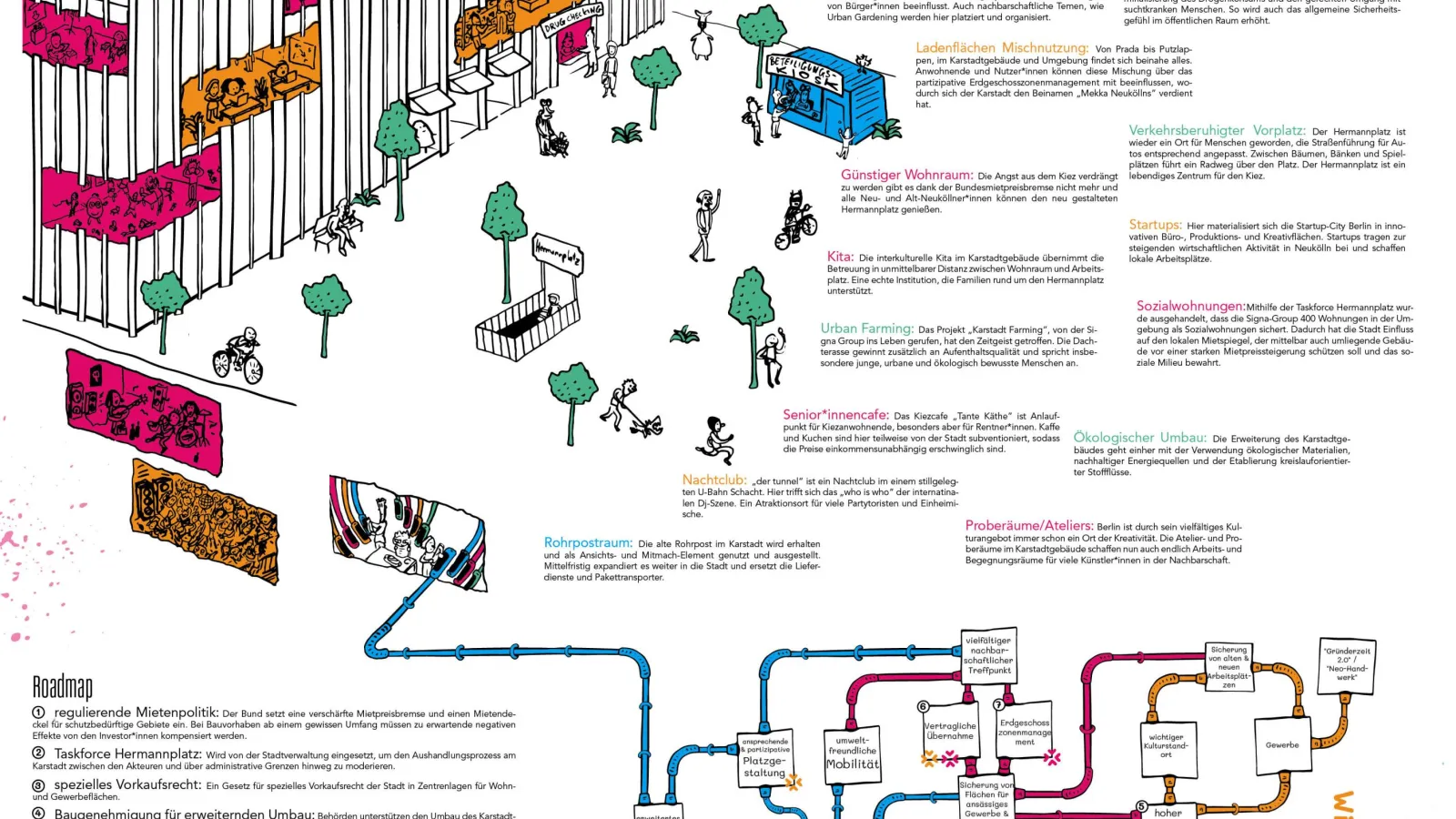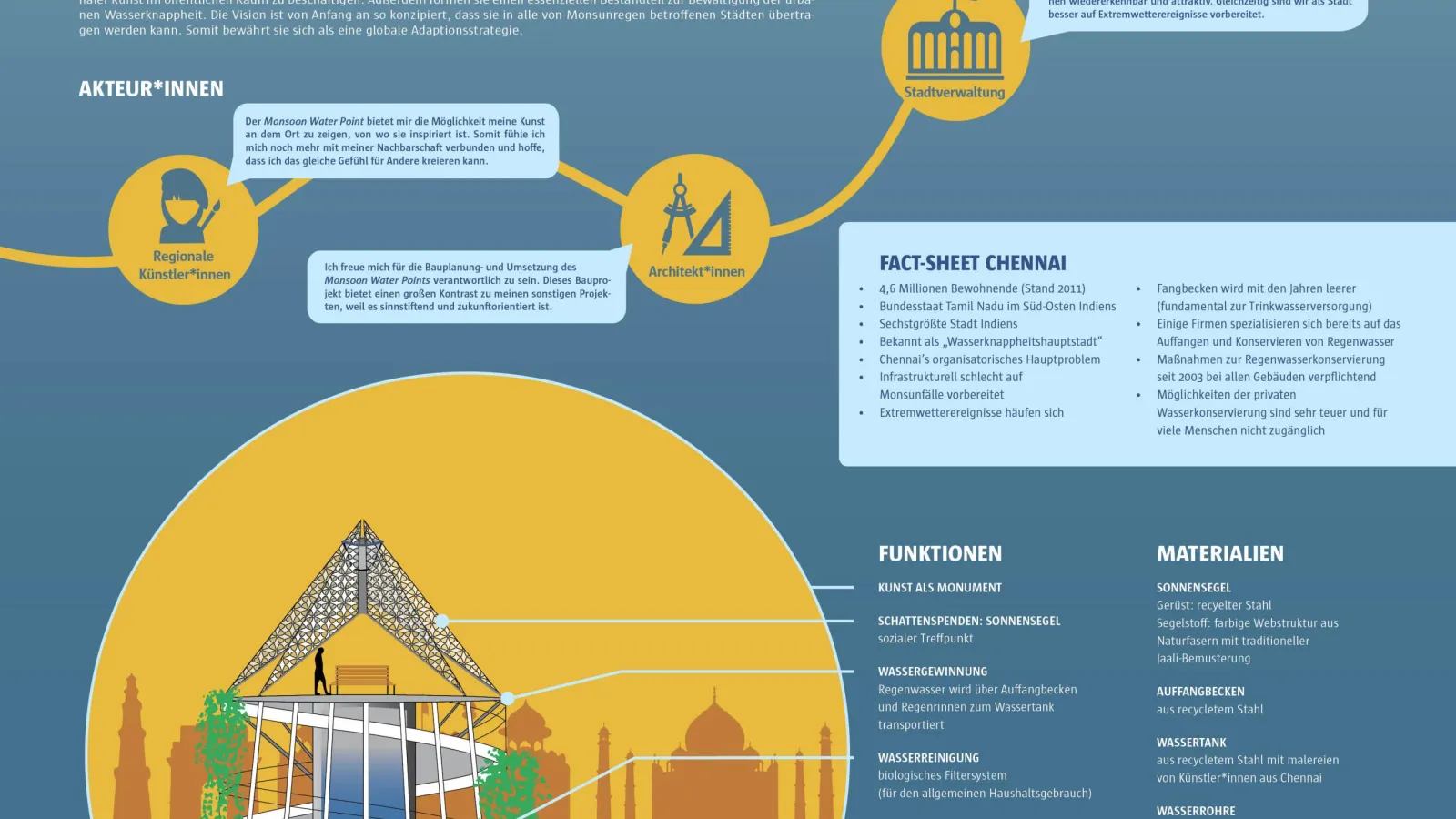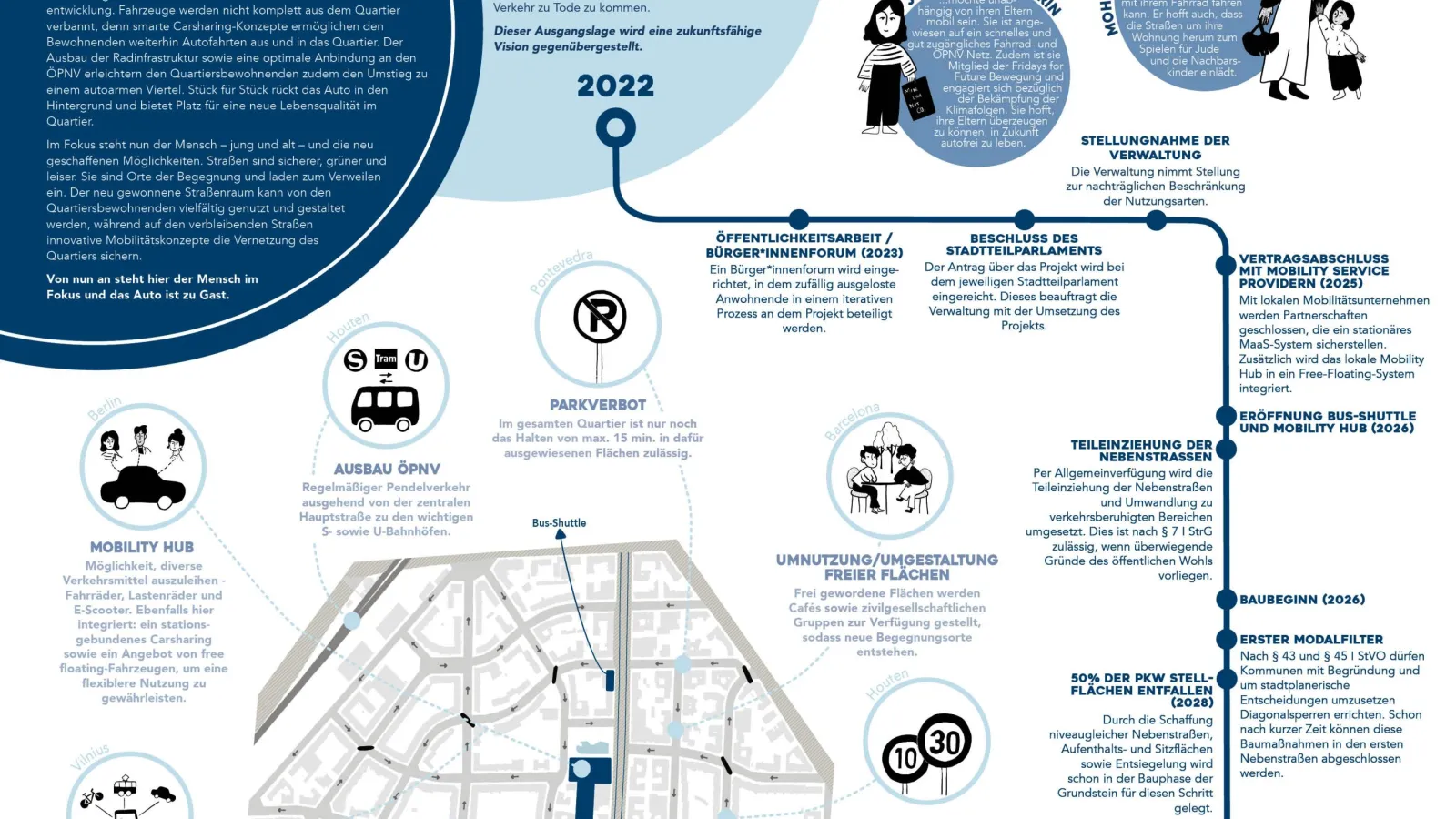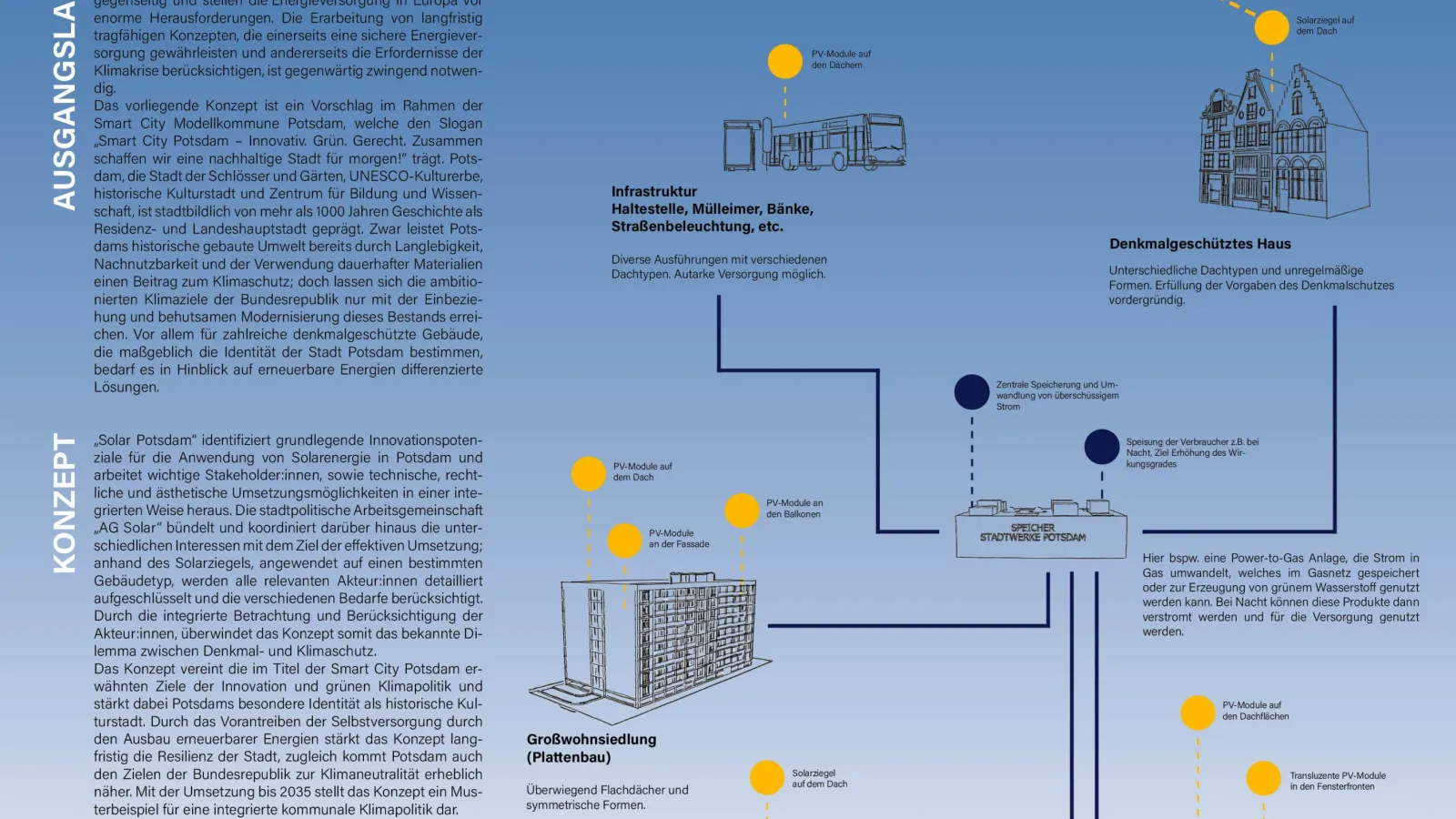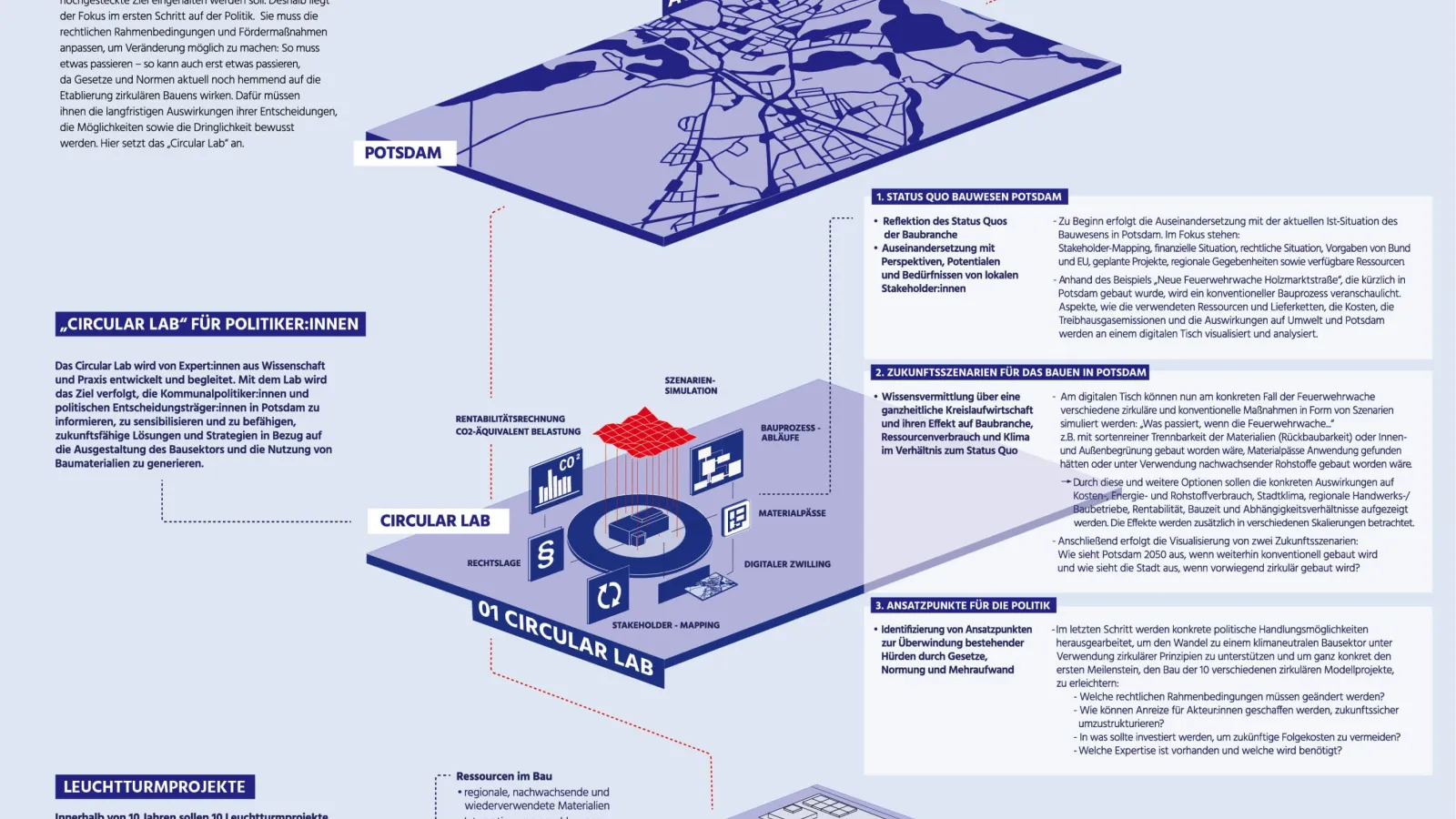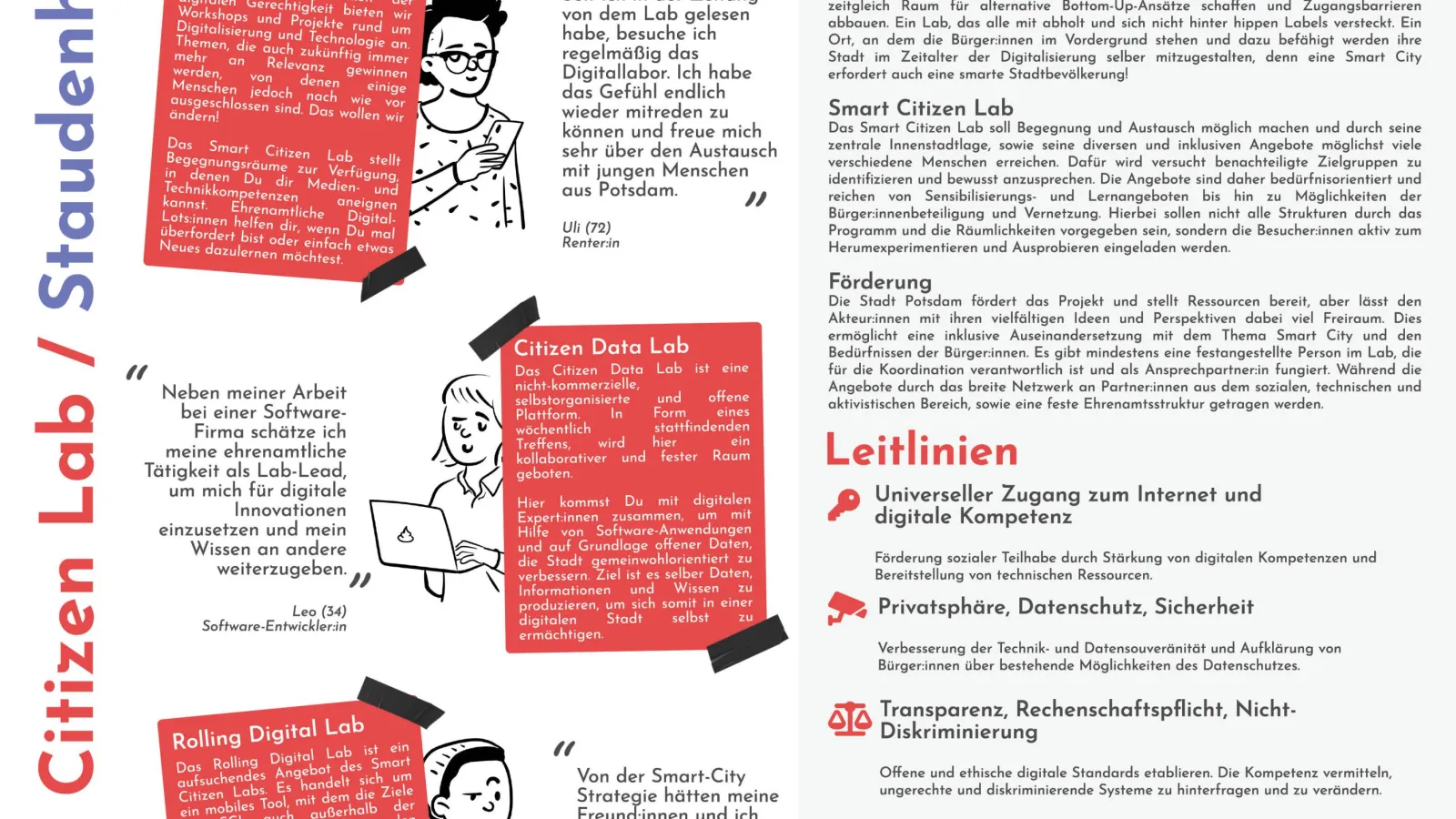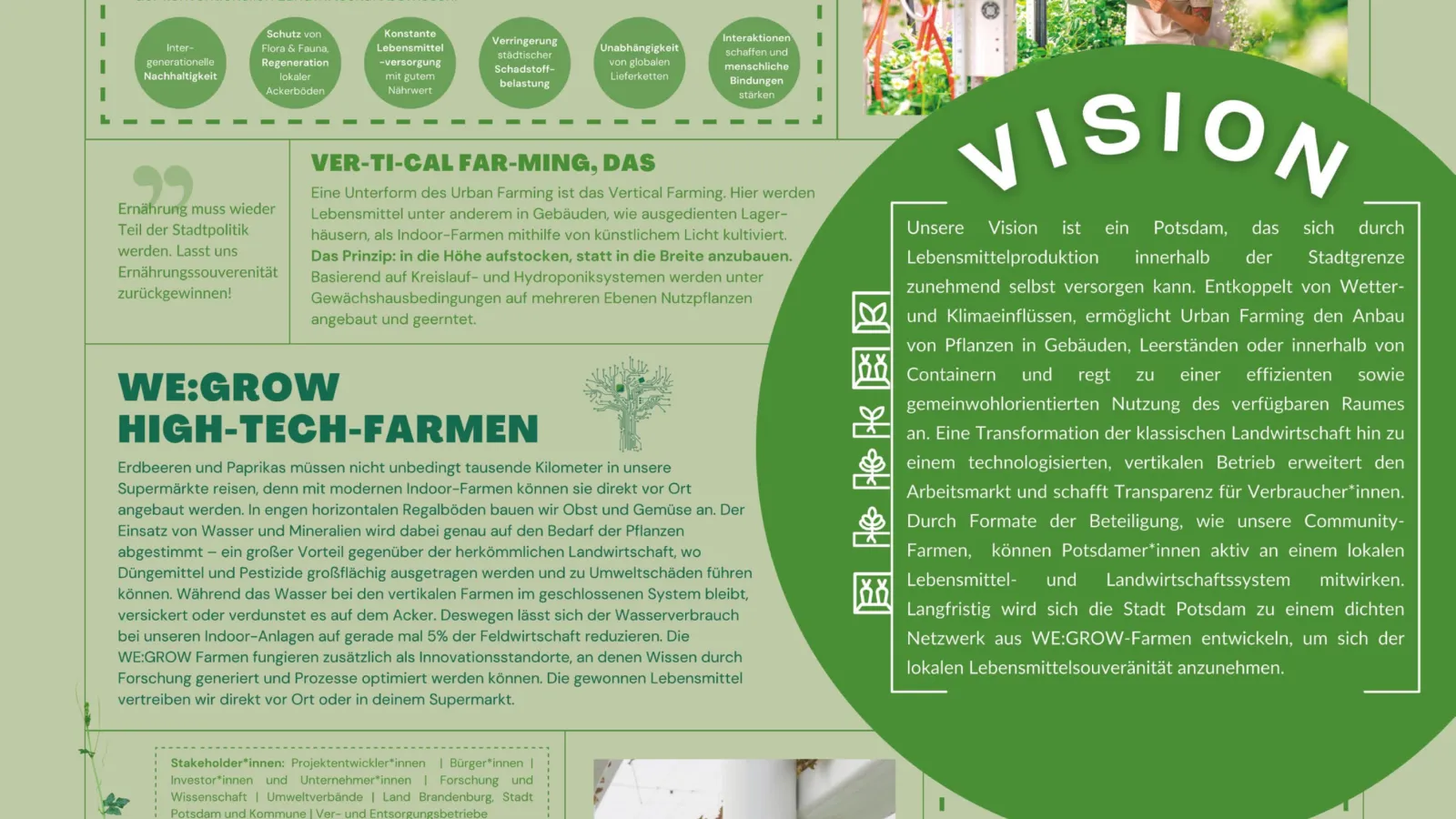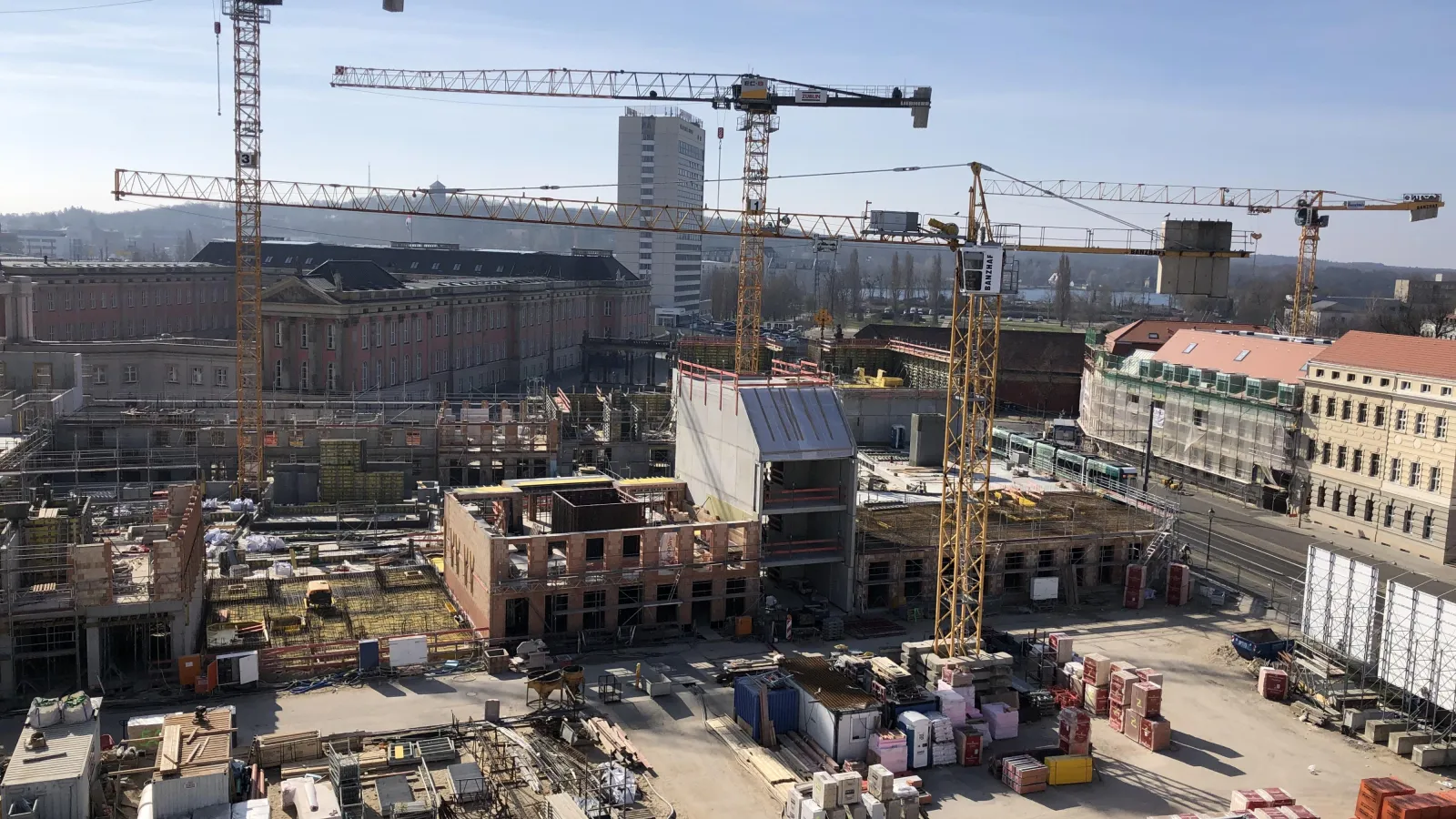The master's programme urban future offers students from different disciplinary backgrounds the opportunity to study urban transformation processes in an inter- and transdisciplinary way. You will acquire the necessary subject-specific and interdisciplinary skills and knowledge that will enable you to work independently, scientifically, creatively and interdisciplinarily, to critically reflect on scientific findings and to act responsibly in the context of urban transformation processes. In each academic year, there is a specific cohort topic on which in-depth content-related knowledge and contacts in research-based practice are established.
Urban Futures (MA)
Profile
Main topics
With regard to disciplinary specialisation, three thematic specialisations are offered that describe central aspects of urban systems and focus on the design of spatial, social, infrastructural, cultural and aesthetic processes and structures – each from a different perspective: the built, social and digital city.
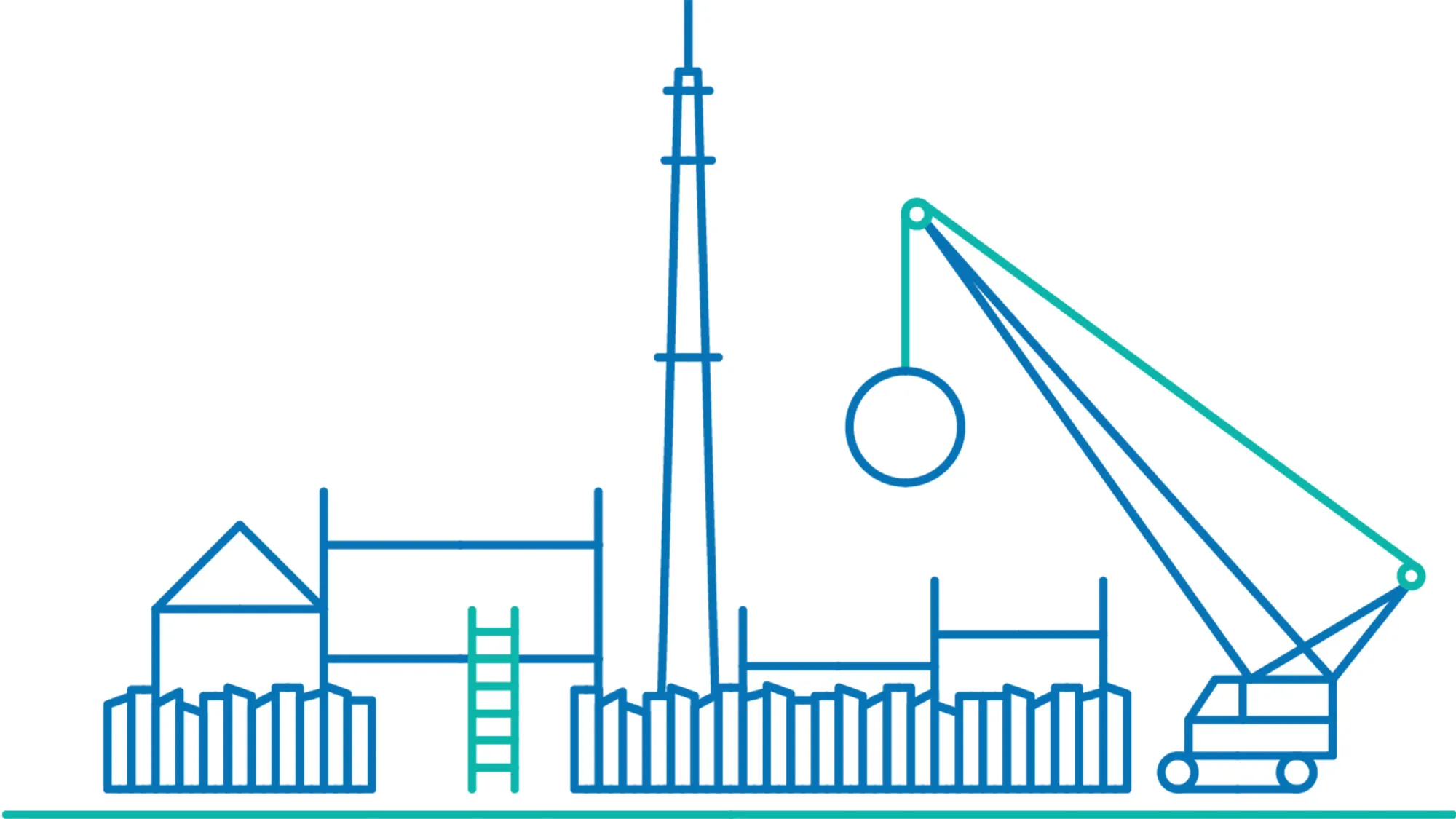
Built city
- Sustainable infrastructures
- Sustainable neighbourhood development
- Urban metabolism
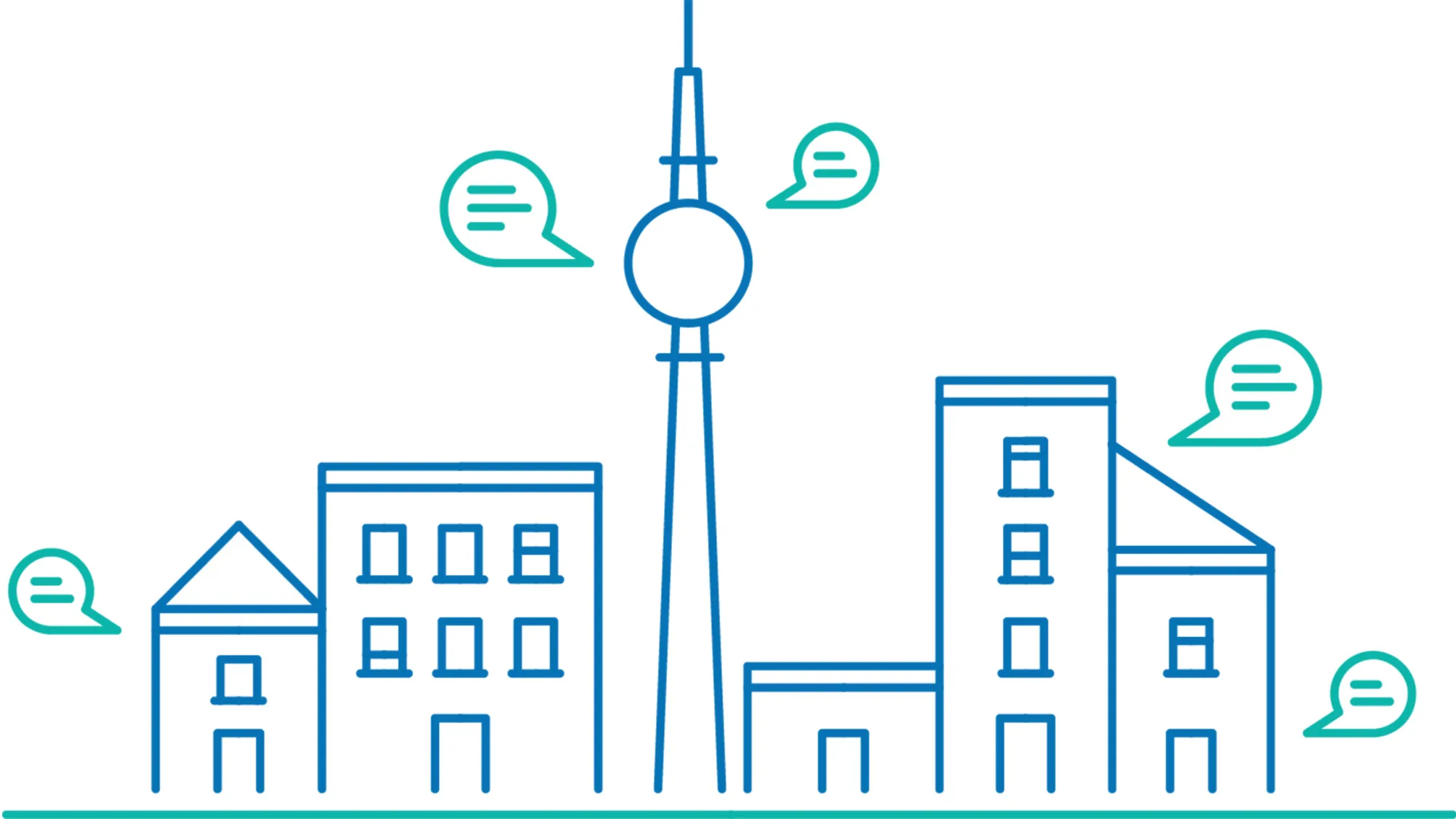
Social city
- Demographic change, heterogeneity and social inequality
- Participation and active shaping of transformation processes
- Attitudinal and behavioural change
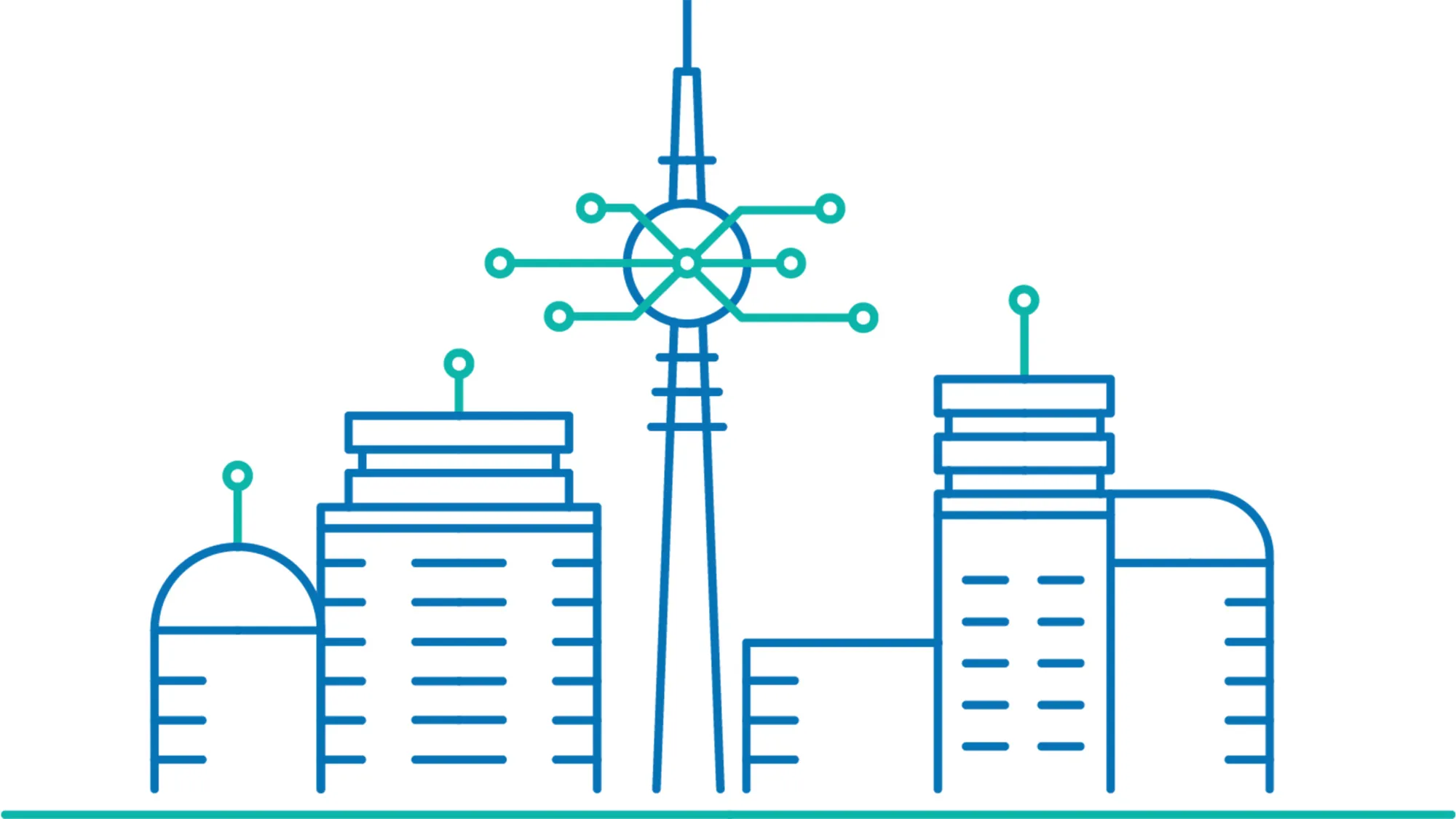
Digital city
- Analysis and visualisation of urban data
- Digital transformation in media, culture and economy
- Algorithmic ethics and responsibility
Study the city of tomorrow
The transformation of urban spaces into sustainable structures is one of the great challenges of our time. This transformation encompasses ecological, spatial, structural, social, cultural, design, infrastructural, technological and economic aspects equally and interdependently, for whose challenges there are no simple and sectoral solutions. The research-oriented master's programme urban futures enables you to think in a networked manner and to work in an interdisciplinary manner, to tap your creativity and innovation potential and to acquire profound knowledge and contacts for research-based practice.
Video Urban Futures
The major challenges of sustainable urban development include demographic change, climate protection strategies, measures as a result of social segregation, participation processes and big data in the context of urban infrastructure (smart cities). The master's degree in urban futures provides the technical and methodological competences required to carry out well-founded analyses of these tasks and to develop integral solutions.
Is this degree programme right for me?
In the master's programme, you will be enabled to think in a networked manner in the context of urban development and to work in an interdisciplinary manner, as well as to tap into your creativity and innovation potential. You will be provided with profound knowledge and contacts in research practice. The variety of content-related and methodological topics and questions inherent in the complexity of the topic of "Urban Future" cannot be fully covered in a four-semester master's programme. This makes it all the more important to practise an attitude of lifelong research-based learning during the degree programme in order to be able to move competently in the worldwide and constantly changing range of knowledge.
You bring these qualities with you
- Interested in research and engagement with building, social science or information technology issues in the bachelor's degree programme
- Interest in creative activity
- Analytical and conceptual way of thinking
- Independence, communication, organisational and team skills
Further information
- Year topic
- FAQ at the bottom of this page
- Information on career prospects
- Social Media: Twitter, Mastodon
Information day for prospective students on the 6th of May 2024
Would you like to get to know the course content better, talk to students and discover the campus? Come to the info day of the urban futures degree programme of the CITY | BUILDING | CULTURE department on the 6th of May 2024 online via Zoom!
FAQ
This list is intended to help you answer the most frequently asked questions about our master's programme urban futures. If you have any further questions, please feel free to send us a personal request via the e-mail address uz@fh-potsdam.de. We will answer you as soon as possible.
Urban Future Talks
Die Urban Future Talks thematisieren Fragen sta?dtischer Transformation. Mit ihnen wollen wir die Komplexita?t urbaner Prozesse in einer digitalen Zeit besser verstehen und Wege fu?r eine nachhaltige urbane Entwicklung aufzeigen. Als diskursives Format ermo?glichen sie einen engen Austausch zwischen Theorie und Praxis. #UrbanFutureTalks
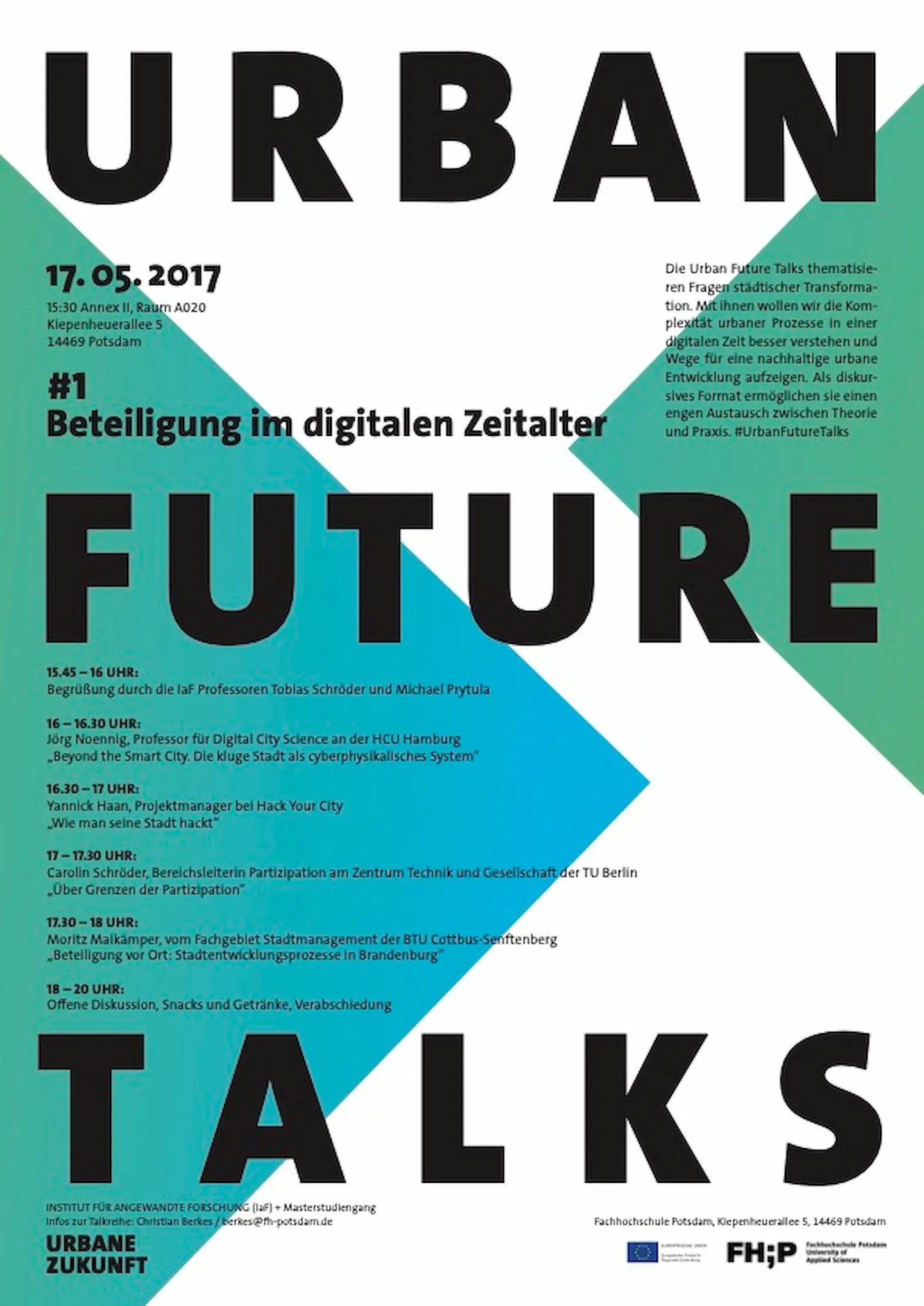
Urban Future Talk #1 | Beteiligung im digitalen Zeitalter
G?ste und Themen:
J?rg Noenning - Professor für Digital City Science an der HCU Hamburg
Beyond the Smart City. Die kluge Stadt als cyberphysikalisches System
Yannick Haan - Projektmanager bei Hack Your City
Carolin Schr?der - Bereichsleiterin Partizipation am Zentrum Technik und Gesellschaft der TU Berlin
?ber Grenzen der Partizipation
Moritz Maik?mper - Fachgebiet Stadtmanagement der BTU Cottbus-Senftenberg
Beteiligung vor Ort: Stadtentwicklungsprozesse in Brandenburg
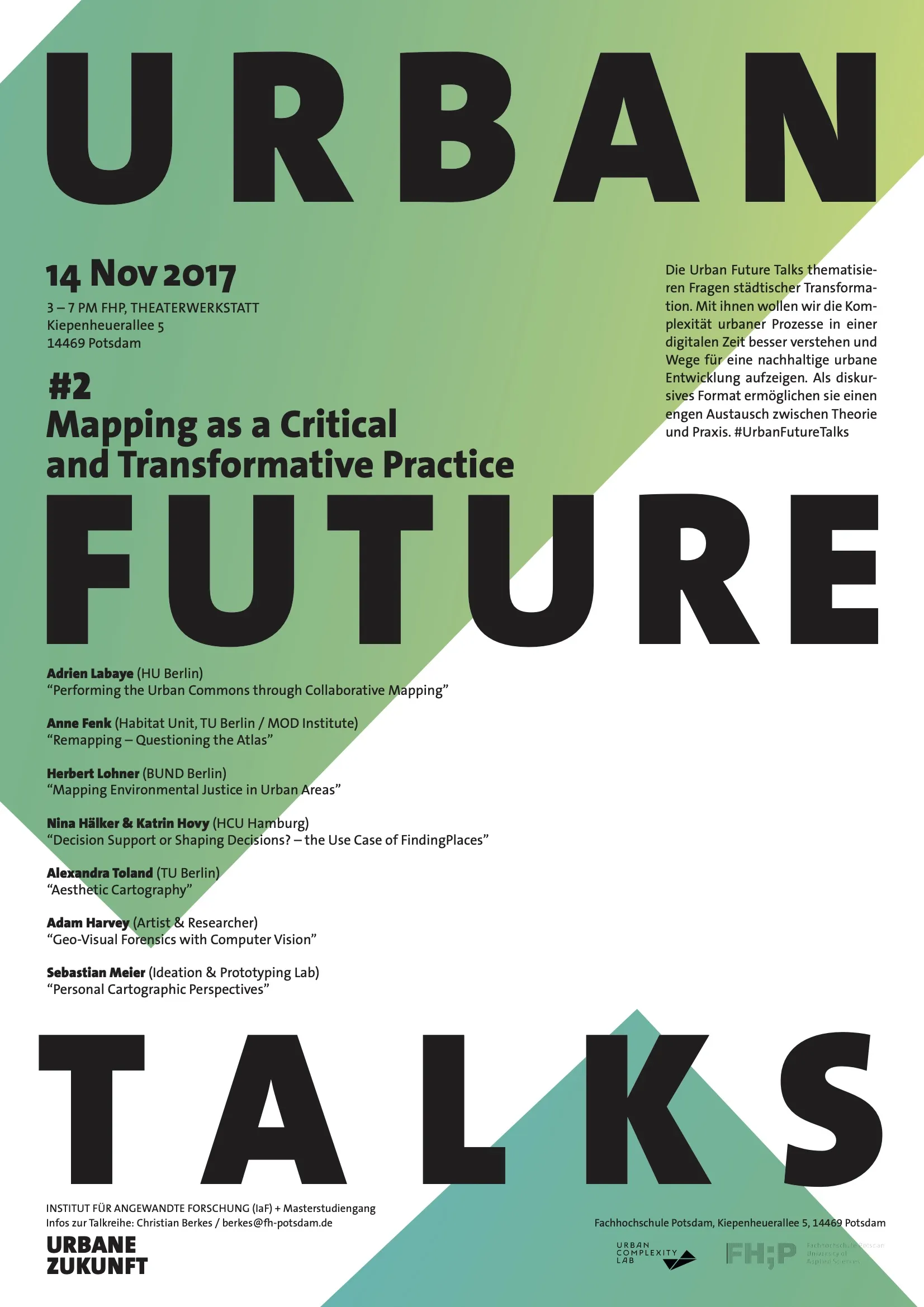
Urban Future Talk #2 | Mapping as a Critical and Transformative Practice
G?ste und Themen:
Adrian Labaye - HU Berlin
Performing the Urban Commons trough Collaborative Mapping
Anne Fenk - Habitat Unit, TU Berlin / MOD Institute
Remapping - Questioning the Atlas
Herbert Lohner - BUND Berlin
Mapping Environmental Justice in Urban Areas
Nina H?lker und Katrin Hovy - HCU Hamburg
"Decision Support or Shaping Decisions? – the Use Case of FindingPlaces"
Alexandra Toland- TU Berlin
Adam Harvey - Artist & Researcher
Geo-Visual Forensic with Computer Vision
Sebastian Meier - Technologiestiftung Berlin Ideation and Prototyping Lab
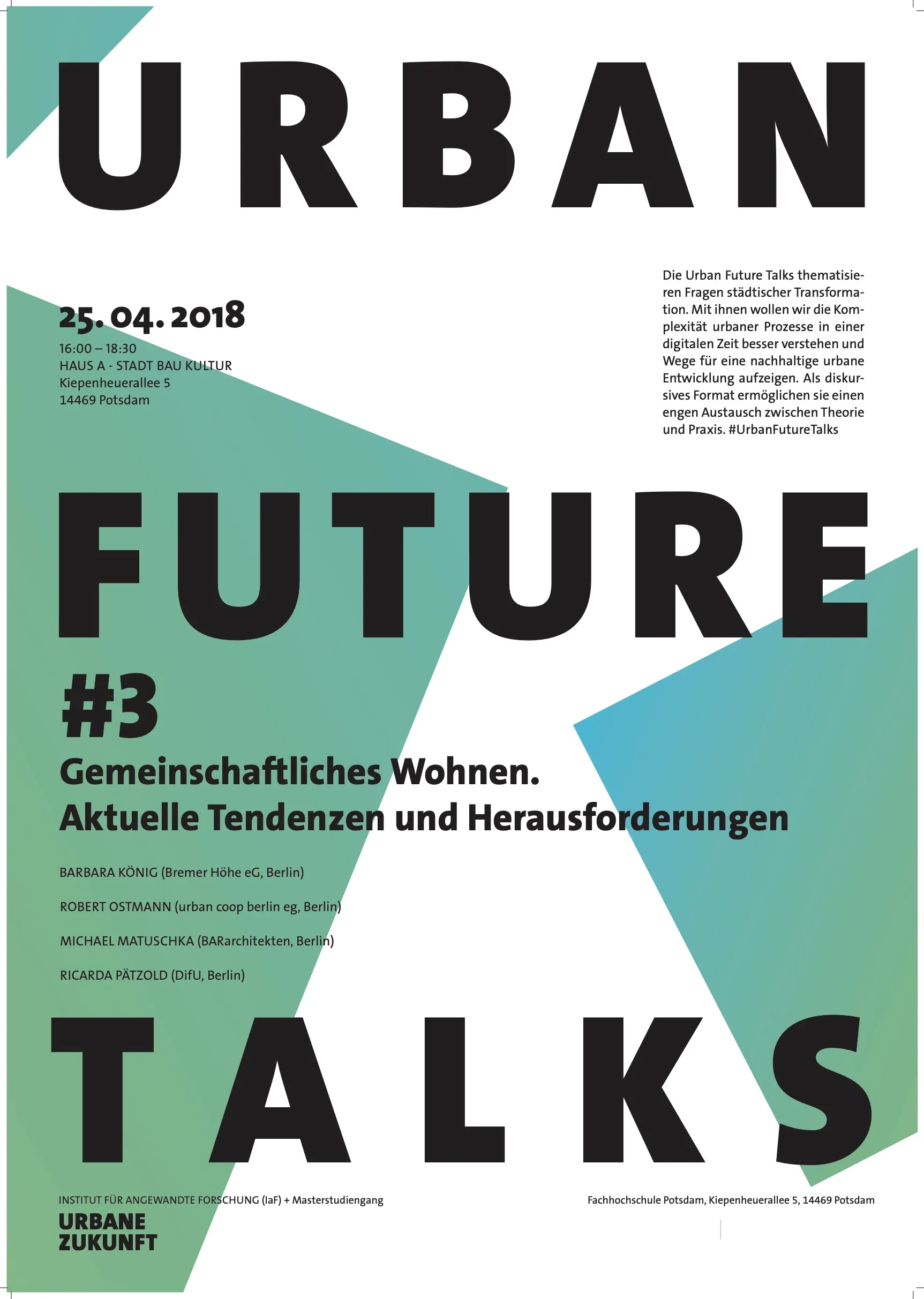
Urban Future Talk #3 | Gemeinschaftliches Wohnen. Aktuelle Tendenzen und Herausforderungen
Die gesellschaftliche Debatte um gemeinschaftliche Wohnformen hat sich in den letzten Jahren ver?ndert. Es besteht eine gr??ere Akzeptanz fu?r gemeinschaftliche Wohnformen, deren Beitrag fu?r eine nachhaltige Stadtentwicklung anerkannt wird. Doch der Weg von der Nische zum Trend wird zunehmend durch steigende Boden‐ und Baupreise versperrt. Neue F?rderinstrumente helfen nur bedingt, da weiter unklar ist, was denn die besondere F?rderwu?rdigkeit gemeinschaftlicher Wohnformen ausmacht. Zugleich f?chern sich Idee und Praxis gemeinschaftlicher Wohnformen weiter auf: neben Baugruppen und Projektinitiativen, die sich u?ber Genossenschaften oder Syndikat ein Haus bauen, wollen auch gro?e Wohnungsbauunternehmen Elemente gemeinschaftlichen Wohnens im Neubau integrieren. Und in neuen, teils kommerziell, teils non‐profit‐basierten Mini‐Apartment‐H?usern oder co‐work/co‐living wird Gemeinschaft noch mal flexibler und partieller ausgestaltet. In der Veranstaltung wurden vier Perspektiven vorgestellt und diskutiert zu den Fragen, was das Besondere gemeinschaftlichen Wohnens ausmacht und wie ein gesellschaftlicher und f?rderwu?rdiger Mehrwert von "Gemeinschaftlichem Wohnen" definiert werden kann.
Barbara K?nig – Bremer H?he eG, Berlin
Robert Ostmann – urban coop berlin eG, Berlin
Michael Matuschka – BARchitekten, Berlin
Welche Rolle spielen Architekten (noch) als Initiator gemeinschaftlicher Wohnprojekte?
Ricarda P?tzold – DifU, Berlin
?Die Relevanz und der Mehrwert gemeinschaftlichen Wohnens aus Sicht der Kommunen“
Contact
The colleagues at the student counselling service provide information to prospective students, first-year students, parents, teachers and students on all general questions about the degree programme. If you have specific questions or concerns about the master's programme urban futures, please contact the subject counselling service.
Subject Counselling 足球比分网
Subject Counselling 足球比分网
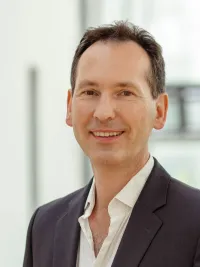
Study Content
Course of studies
The standard period of study for the full-time degree programme urban futures is four semesters and concludes with a master of arts degree. The study plan gives you a detailed overview.
| Semester 1 | Visions of urban futures, city as a complex system, methods, electives |
| Semester 2 | Inter- and transdisciplinary project, methods, electives |
| Semester 3 | Research internship, electives |
| Semester 4 | Master's thesis and colloquium |
Study content
In the master's degree programme urban futures, you will study with a high project component, which serves to translate and further develop the state of research taught in the degree programme into feasible concepts for urban problems in a practical manner. The focus is on promoting methodological competence while taking disciplinary in-depth studies into account.
In the currently valid module handbooks, study and examination regulations and statutes of the urban futures degree programme, you will find the module overview, a detailed description of the modules and study contents, the study plan as well as the statutes for the implementation of the university selection procedure for the master's degree programme urban futures.
Modules
- Visions of urban futures
- System City
- Futurology
- Reading Group
- Data Science
- Inter- and transdisciplinary project
- Project and Change Management
- Modelling of Complex Systems
- Individualised study (electives)
Research internship
In cooperation with municipal and city-related partners and under the supervision of lecturers, you will carry out a practice-oriented research internship of 560 hours.
Master thesis
- Master's thesis and colloquium with accompanying supervision
Results from the urban futures degree programme (selection)
Research projects
More projects
TDR4HAW: Transdisciplinary Research at Universities of Applied Sciences – Status Quo and Potential of a Sleeping Giant
The project consortium analyses research at universities of applied sciences (UAS) with a special focus on transdisciplinary research projects.
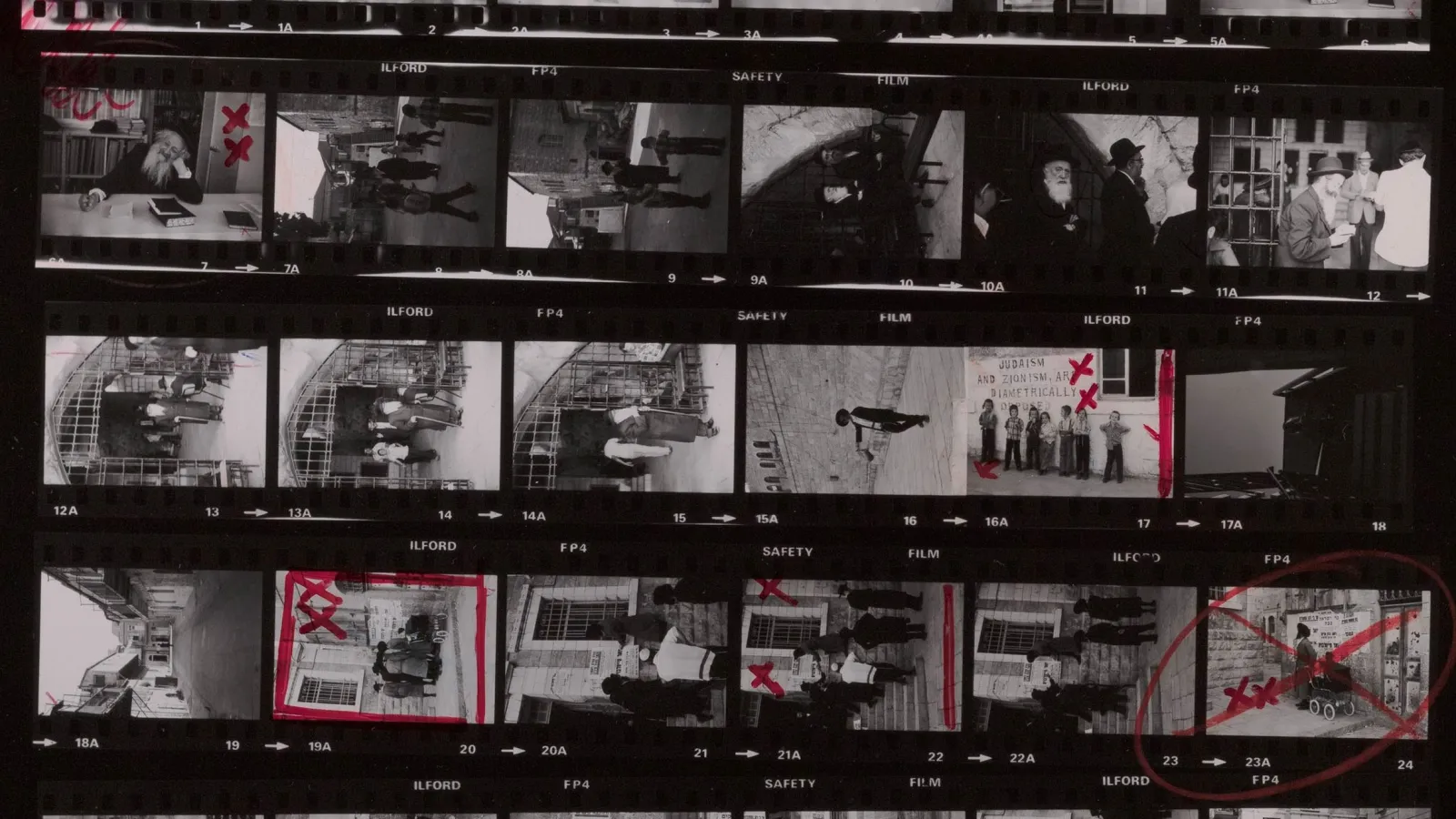
GraDiM: Granularities of Dispersion and Materiality – Visualising a Photo Archive on Diaspora
In collaboration with photographer Frédéric Brenner and his international project team, the GraDiM research project is developing theoretical and technical concepts for the visualisation of a photo archive with particular sensitivity for a collection documenting the Jewish diaspora.
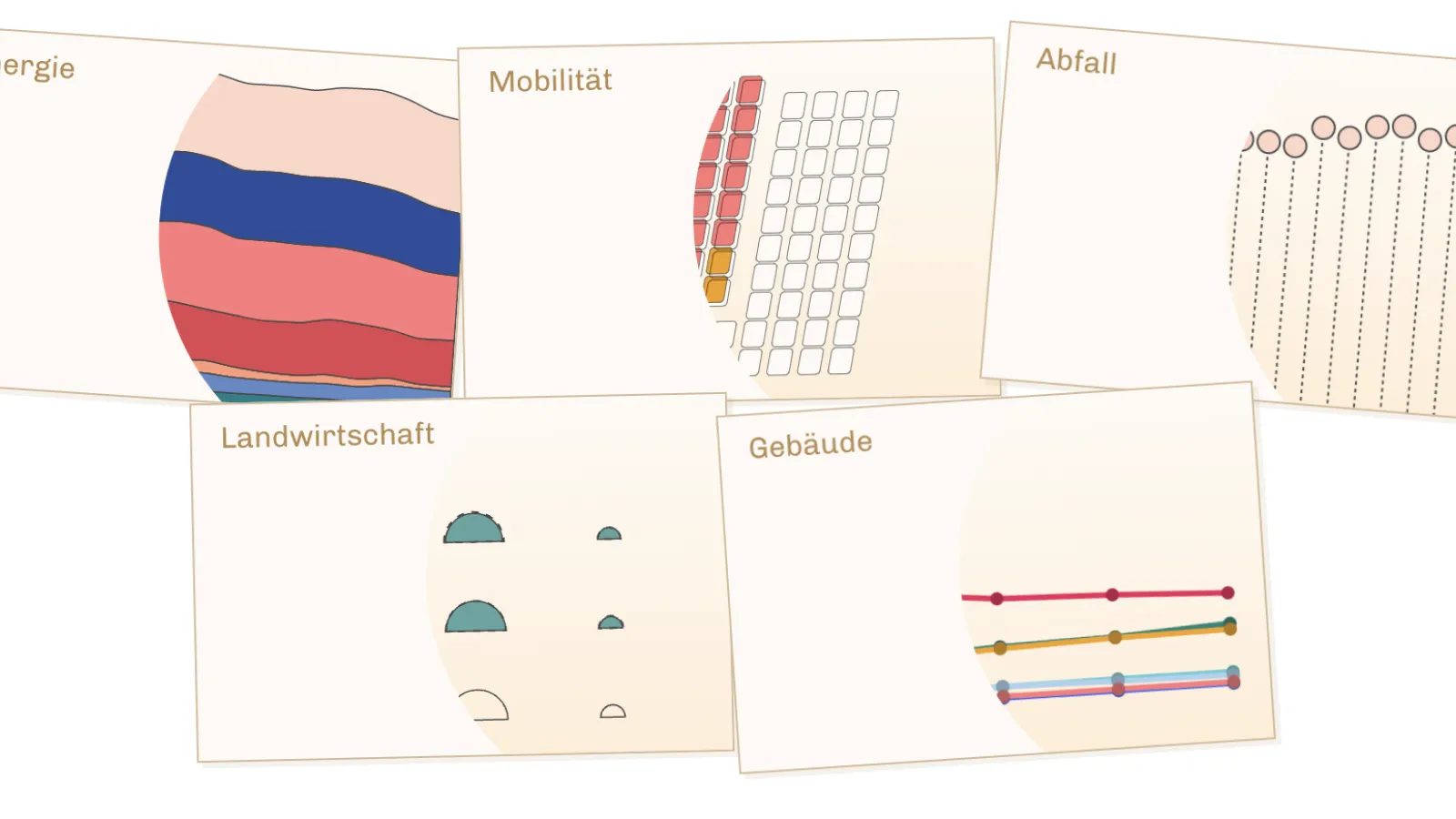
CLIMATE MAPS: Visualising Local Climate Futures
Cooperation with the daily newspapers taz and UCLAB with the aim of conveying climate information via various channels using data visualisations. For this purpose, both physical and digital postcards with visualisations on different aspects of climate protection in Germany were designed and produced.
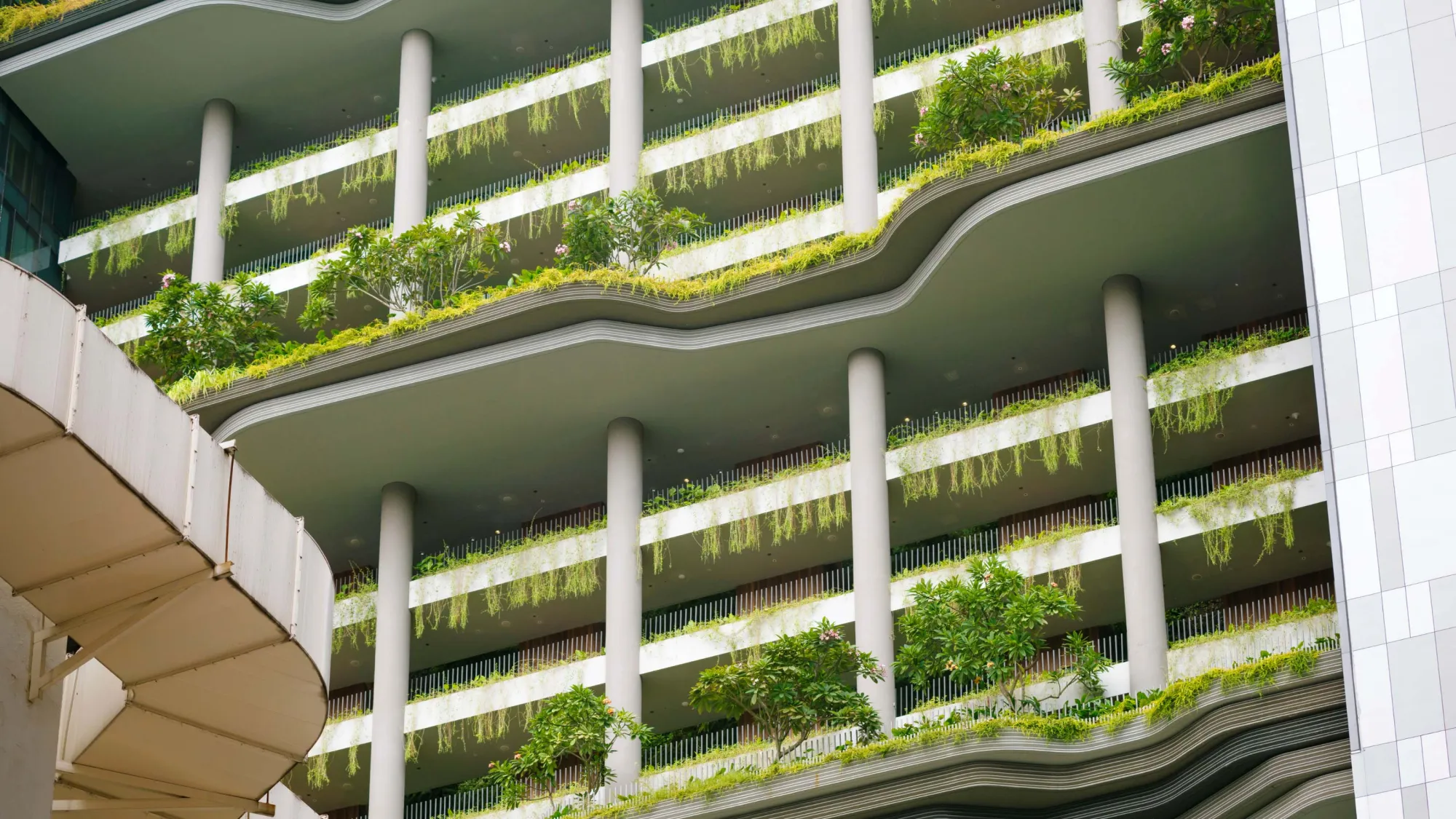
In study
On the pages of the CITY | BUILDING | CULTURE department you will find further useful information and documents on the degree programme, for example on the organisation of the degree programme, the course catalogue and the research internship. Furthermore, current projects of the degree programme are presented there.
Career Prospects
Career prospects
You will be trained to conduct inter- and transdisciplinary research into visions of the future so that you can develop complex approaches to solutions for sustainable urban development in the context of building and housing, technical infrastructure and mobility, as well as demography and social structure. The competent use of data spaces and visualisations and other digital research methods is a central cross-cutting theme in all of the above-mentioned subject areas.
Extensive research projects and development projects are created in cooperation with practical partners from the economy, municipal administrations and scientific institutions. These enable a research-oriented study structure and direct participation in research and development processes within the framework of the study projects, internships and master's theses.
The concept of a transformation manager who works as an interface communicator, especially in the field of urban development and in the communication of political and social institutions or associations, serves as a model.
Possible areas of application
- Companies and institutions whose task is the production, design and mediation of urban living spaces, such as consulting companies, interface and communication design, research and development in the field of human-machine interfaces as well as cultural work, media and communication, marketing and tourism.
- International companies with a service portfolio for urban services and infrastructures
- Start-ups
- International organisations
- Access to management positions and higher service
Scientific career
The entitlement to a doctorate also opens the way to an academic career, e.g. in university or non-university research and teaching.
Application & Contact
Dates & requirements for your application
The most important deadlines, dates and admission requirements for the master's programme urban futures are compiled here. You can find out which steps you need to take for a successful application in the next section.
Dates
- 6th of May: Info day for Urban Futures (online)
- until 15th of June: submit online application
Access requirements
First professional university degree (at least 180 ECTS credits) in the following fields of study:
- Technical/design-related: e.g. architecture and urban planning, design, urban and spatial planning, civil engineering
- social science-related: including sociology, psychology, social work, cultural work, politics, geography
- related to data and information processing: including computer science, information science, statistics and data science, computer visualistics
This is how you apply!
In the following, we explain which aspects you should pay attention to from the online application to enrolment (registration).
Further information
The following links provide you, and especially international applicants, with further information on the topics of application and enrolment at the University of Applied Sciences Potsdam.

International applicants
You would like to apply for studies from the first or a higher semester and have acquired your school-leaving qualification and/or university degree abroad? Then you can have degrees and achievements acquired abroad recognised and study with us.

Application & Enrolment Procedure
The application and study service provides information and advice on general questions regarding the application process, admission and enrolment at the University of Applied Sciences Potsdam, application for a higher semester, but also on topics such as compensation for disadvantages, part-time studies, waiting semesters and hardship applications.
Application & Enrolment University of Applied Sciences Potsdam
Contact & 足球比分网s
The student counselling service provides information and advice on general questions about studying as well as on topics such as choosing a degree programme, application, enrolment and study organisation.
For subject-specific questions on module content, credit transfer, examinations or specialisations in the urban futures degree programme, the subject counselling service is the right place to go.
Subject Counselling 足球比分网
Subject Counselling 足球比分网

Study and Examination 足球比分网
Study Info 足球比分网
studien-info-service@fh-potsdam.de
bewerbungs-service@fh-potsdam.de
campuskarte@fh-potsdam.de
Study 足球比分网
studien-service@fh-potsdam.de
Exam 足球比分网
pruefungs-service@fh-potsdam.de
Family Affairs Commissioner
Office hours
Tue and Thu 9.30 am – 1.30 pm
Commissioner for University Employees with Impairment
Office hours
by arrangement
Contact Persons Department of Student Affairs
